Fit, Fed and Read 2019: Programme Evaluation Research Report
VerifiedAdded on 2023/01/04
|21
|4919
|100
AI Summary
This report provides an evaluation of the Fit, Fed and Read programme, focusing on its impact on children's creativity, educational attainment, and awareness level. The report includes findings from focus groups and recommendations for future practice.
Contribute Materials
Your contribution can guide someone’s learning journey. Share your
documents today.
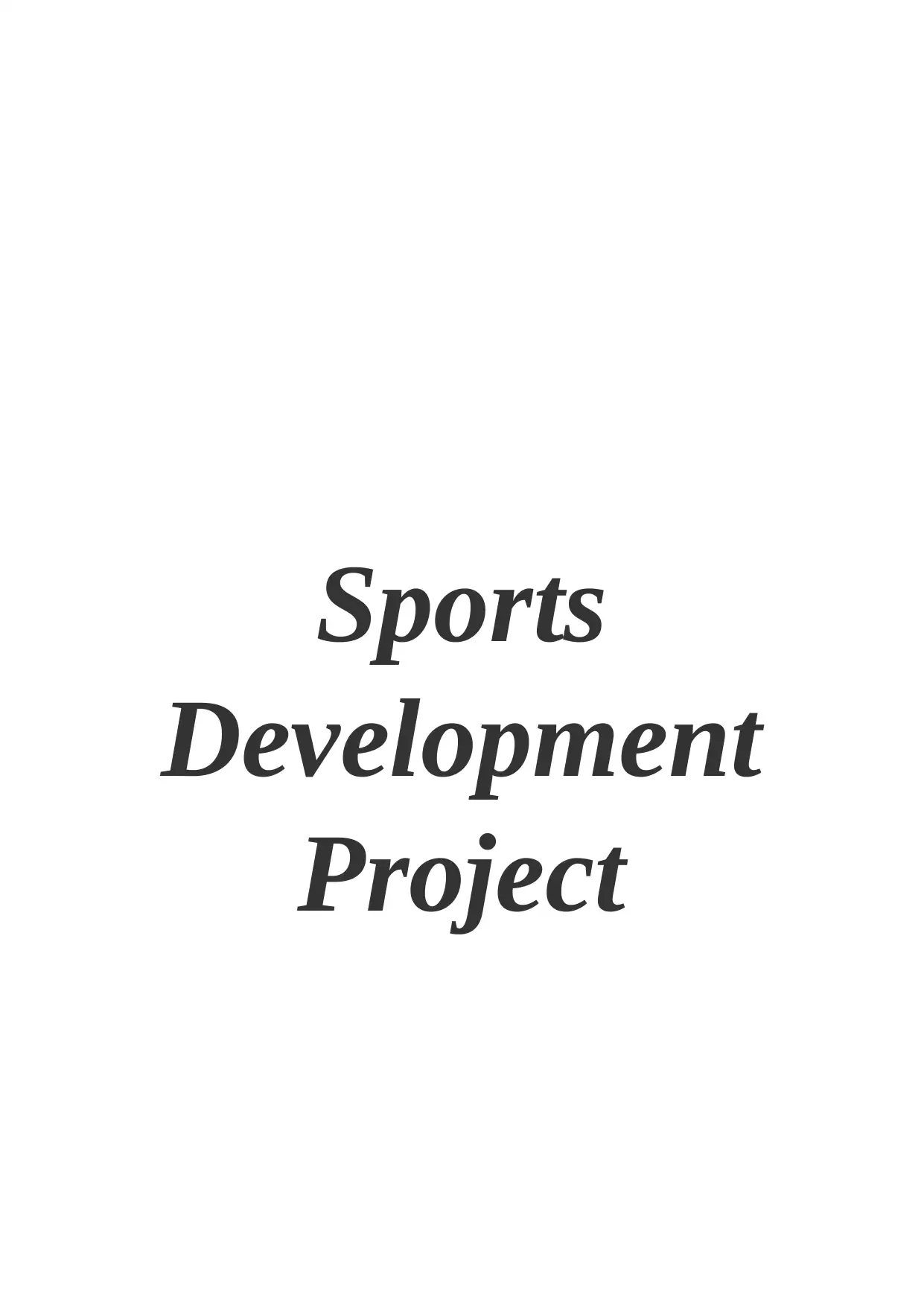
Sports
Development
Project
Development
Project
Secure Best Marks with AI Grader
Need help grading? Try our AI Grader for instant feedback on your assignments.
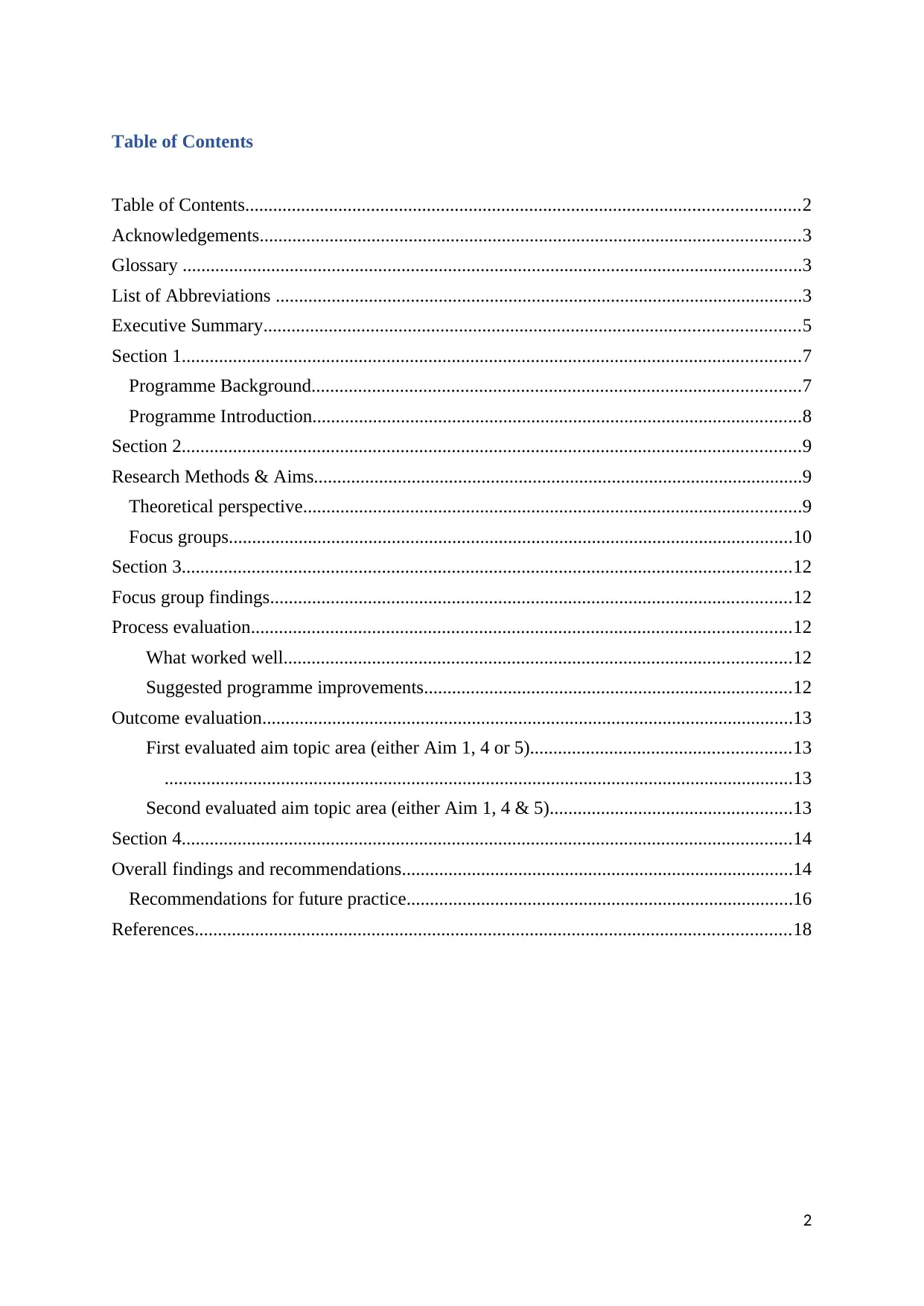
Table of Contents
Table of Contents.......................................................................................................................2
Acknowledgements....................................................................................................................3
Glossary .....................................................................................................................................3
List of Abbreviations .................................................................................................................3
Executive Summary...................................................................................................................5
Section 1.....................................................................................................................................7
Programme Background.........................................................................................................7
Programme Introduction.........................................................................................................8
Section 2.....................................................................................................................................9
Research Methods & Aims.........................................................................................................9
Theoretical perspective...........................................................................................................9
Focus groups.........................................................................................................................10
Section 3...................................................................................................................................12
Focus group findings................................................................................................................12
Process evaluation....................................................................................................................12
What worked well.............................................................................................................12
Suggested programme improvements...............................................................................12
Outcome evaluation..................................................................................................................13
First evaluated aim topic area (either Aim 1, 4 or 5)........................................................13
.......................................................................................................................................13
Second evaluated aim topic area (either Aim 1, 4 & 5)....................................................13
Section 4...................................................................................................................................14
Overall findings and recommendations....................................................................................14
Recommendations for future practice...................................................................................16
References................................................................................................................................18
2
Table of Contents.......................................................................................................................2
Acknowledgements....................................................................................................................3
Glossary .....................................................................................................................................3
List of Abbreviations .................................................................................................................3
Executive Summary...................................................................................................................5
Section 1.....................................................................................................................................7
Programme Background.........................................................................................................7
Programme Introduction.........................................................................................................8
Section 2.....................................................................................................................................9
Research Methods & Aims.........................................................................................................9
Theoretical perspective...........................................................................................................9
Focus groups.........................................................................................................................10
Section 3...................................................................................................................................12
Focus group findings................................................................................................................12
Process evaluation....................................................................................................................12
What worked well.............................................................................................................12
Suggested programme improvements...............................................................................12
Outcome evaluation..................................................................................................................13
First evaluated aim topic area (either Aim 1, 4 or 5)........................................................13
.......................................................................................................................................13
Second evaluated aim topic area (either Aim 1, 4 & 5)....................................................13
Section 4...................................................................................................................................14
Overall findings and recommendations....................................................................................14
Recommendations for future practice...................................................................................16
References................................................................................................................................18
2
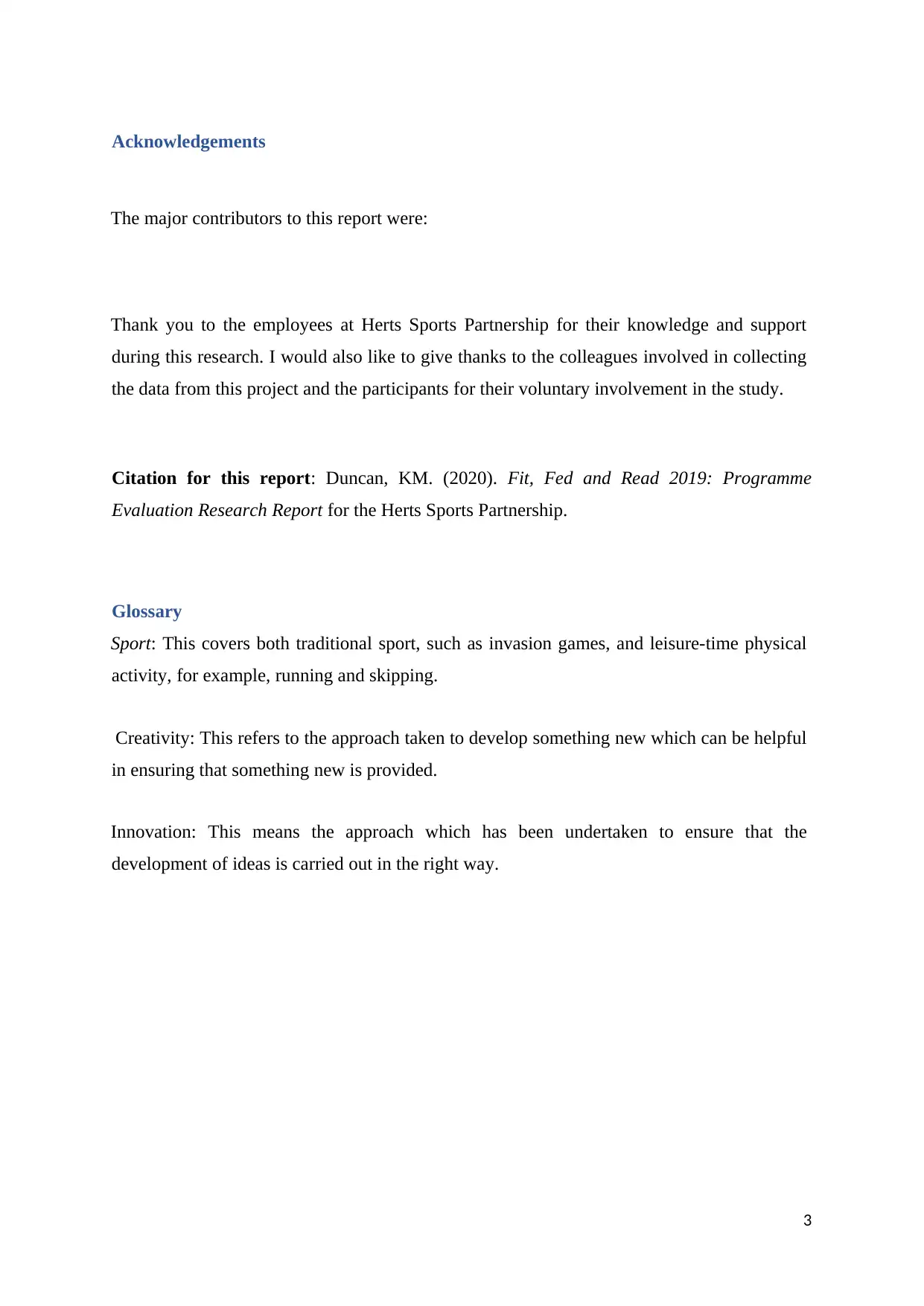
Acknowledgements
The major contributors to this report were:
Thank you to the employees at Herts Sports Partnership for their knowledge and support
during this research. I would also like to give thanks to the colleagues involved in collecting
the data from this project and the participants for their voluntary involvement in the study.
Citation for this report: Duncan, KM. (2020). Fit, Fed and Read 2019: Programme
Evaluation Research Report for the Herts Sports Partnership.
Glossary
Sport: This covers both traditional sport, such as invasion games, and leisure-time physical
activity, for example, running and skipping.
Creativity: This refers to the approach taken to develop something new which can be helpful
in ensuring that something new is provided.
Innovation: This means the approach which has been undertaken to ensure that the
development of ideas is carried out in the right way.
3
The major contributors to this report were:
Thank you to the employees at Herts Sports Partnership for their knowledge and support
during this research. I would also like to give thanks to the colleagues involved in collecting
the data from this project and the participants for their voluntary involvement in the study.
Citation for this report: Duncan, KM. (2020). Fit, Fed and Read 2019: Programme
Evaluation Research Report for the Herts Sports Partnership.
Glossary
Sport: This covers both traditional sport, such as invasion games, and leisure-time physical
activity, for example, running and skipping.
Creativity: This refers to the approach taken to develop something new which can be helpful
in ensuring that something new is provided.
Innovation: This means the approach which has been undertaken to ensure that the
development of ideas is carried out in the right way.
3
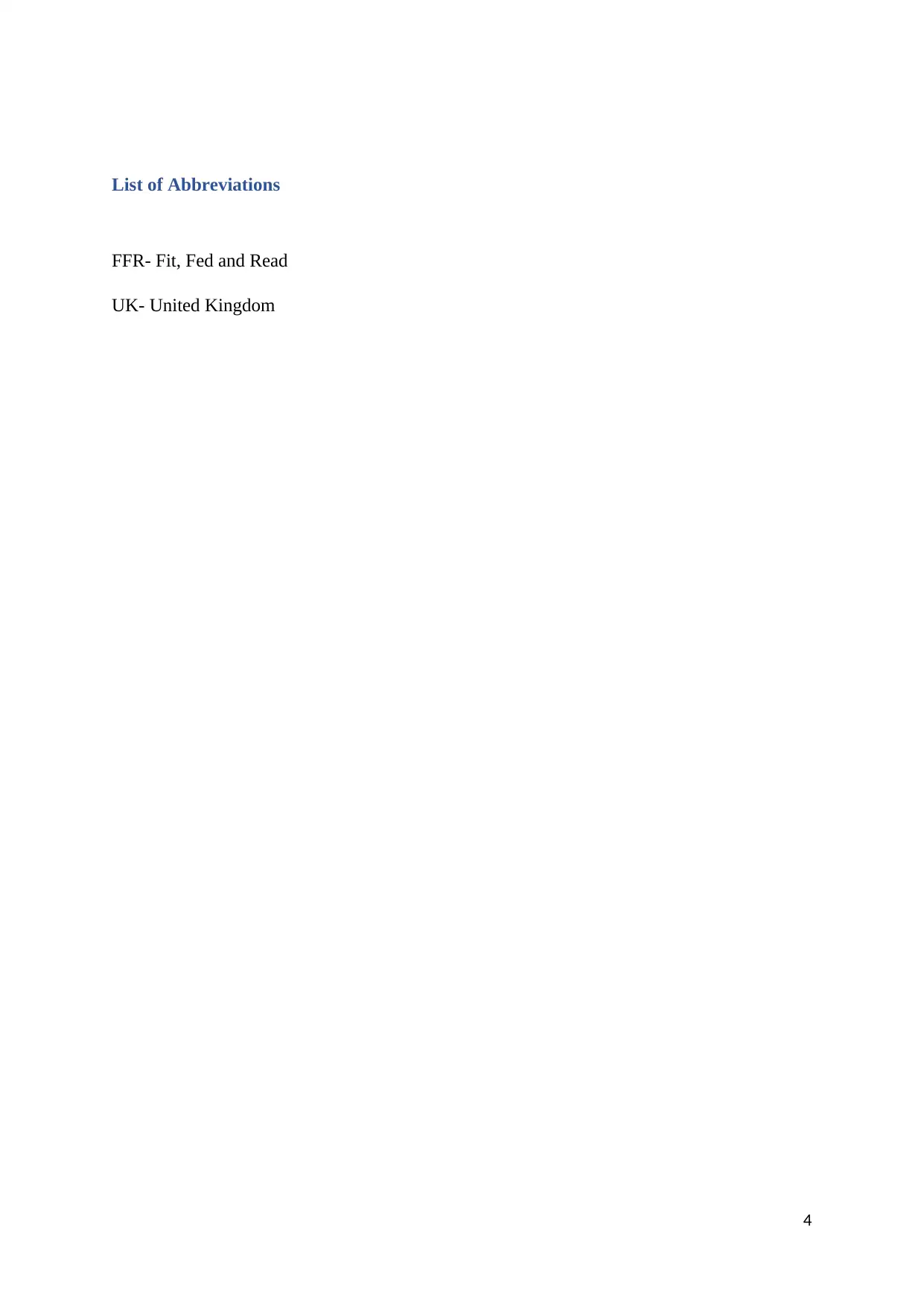
List of Abbreviations
FFR- Fit, Fed and Read
UK- United Kingdom
4
FFR- Fit, Fed and Read
UK- United Kingdom
4
Secure Best Marks with AI Grader
Need help grading? Try our AI Grader for instant feedback on your assignments.
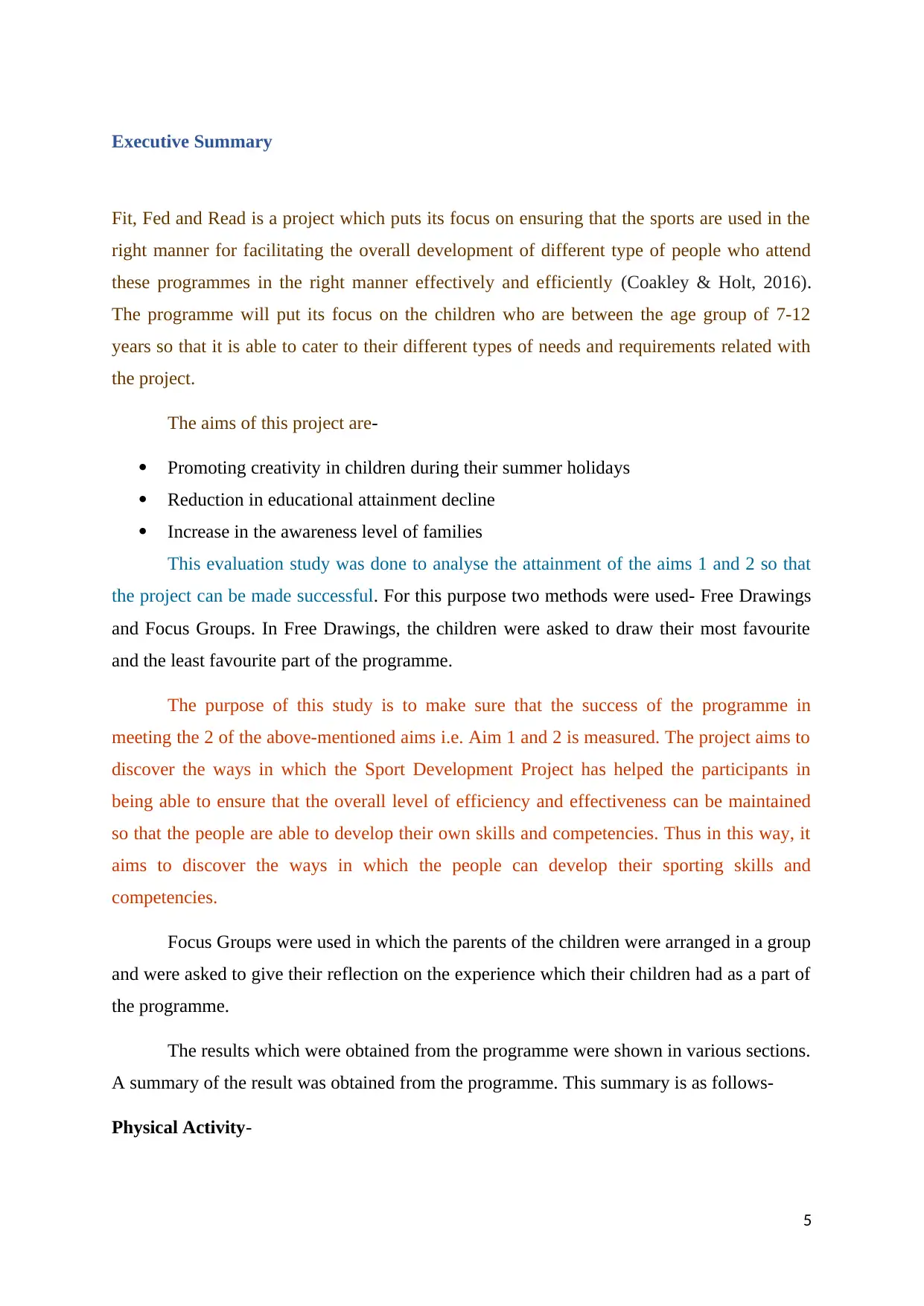
Executive Summary
Fit, Fed and Read is a project which puts its focus on ensuring that the sports are used in the
right manner for facilitating the overall development of different type of people who attend
these programmes in the right manner effectively and efficiently (Coakley & Holt, 2016).
The programme will put its focus on the children who are between the age group of 7-12
years so that it is able to cater to their different types of needs and requirements related with
the project.
The aims of this project are-
Promoting creativity in children during their summer holidays
Reduction in educational attainment decline
Increase in the awareness level of families
This evaluation study was done to analyse the attainment of the aims 1 and 2 so that
the project can be made successful. For this purpose two methods were used- Free Drawings
and Focus Groups. In Free Drawings, the children were asked to draw their most favourite
and the least favourite part of the programme.
The purpose of this study is to make sure that the success of the programme in
meeting the 2 of the above-mentioned aims i.e. Aim 1 and 2 is measured. The project aims to
discover the ways in which the Sport Development Project has helped the participants in
being able to ensure that the overall level of efficiency and effectiveness can be maintained
so that the people are able to develop their own skills and competencies. Thus in this way, it
aims to discover the ways in which the people can develop their sporting skills and
competencies.
Focus Groups were used in which the parents of the children were arranged in a group
and were asked to give their reflection on the experience which their children had as a part of
the programme.
The results which were obtained from the programme were shown in various sections.
A summary of the result was obtained from the programme. This summary is as follows-
Physical Activity-
5
Fit, Fed and Read is a project which puts its focus on ensuring that the sports are used in the
right manner for facilitating the overall development of different type of people who attend
these programmes in the right manner effectively and efficiently (Coakley & Holt, 2016).
The programme will put its focus on the children who are between the age group of 7-12
years so that it is able to cater to their different types of needs and requirements related with
the project.
The aims of this project are-
Promoting creativity in children during their summer holidays
Reduction in educational attainment decline
Increase in the awareness level of families
This evaluation study was done to analyse the attainment of the aims 1 and 2 so that
the project can be made successful. For this purpose two methods were used- Free Drawings
and Focus Groups. In Free Drawings, the children were asked to draw their most favourite
and the least favourite part of the programme.
The purpose of this study is to make sure that the success of the programme in
meeting the 2 of the above-mentioned aims i.e. Aim 1 and 2 is measured. The project aims to
discover the ways in which the Sport Development Project has helped the participants in
being able to ensure that the overall level of efficiency and effectiveness can be maintained
so that the people are able to develop their own skills and competencies. Thus in this way, it
aims to discover the ways in which the people can develop their sporting skills and
competencies.
Focus Groups were used in which the parents of the children were arranged in a group
and were asked to give their reflection on the experience which their children had as a part of
the programme.
The results which were obtained from the programme were shown in various sections.
A summary of the result was obtained from the programme. This summary is as follows-
Physical Activity-
5
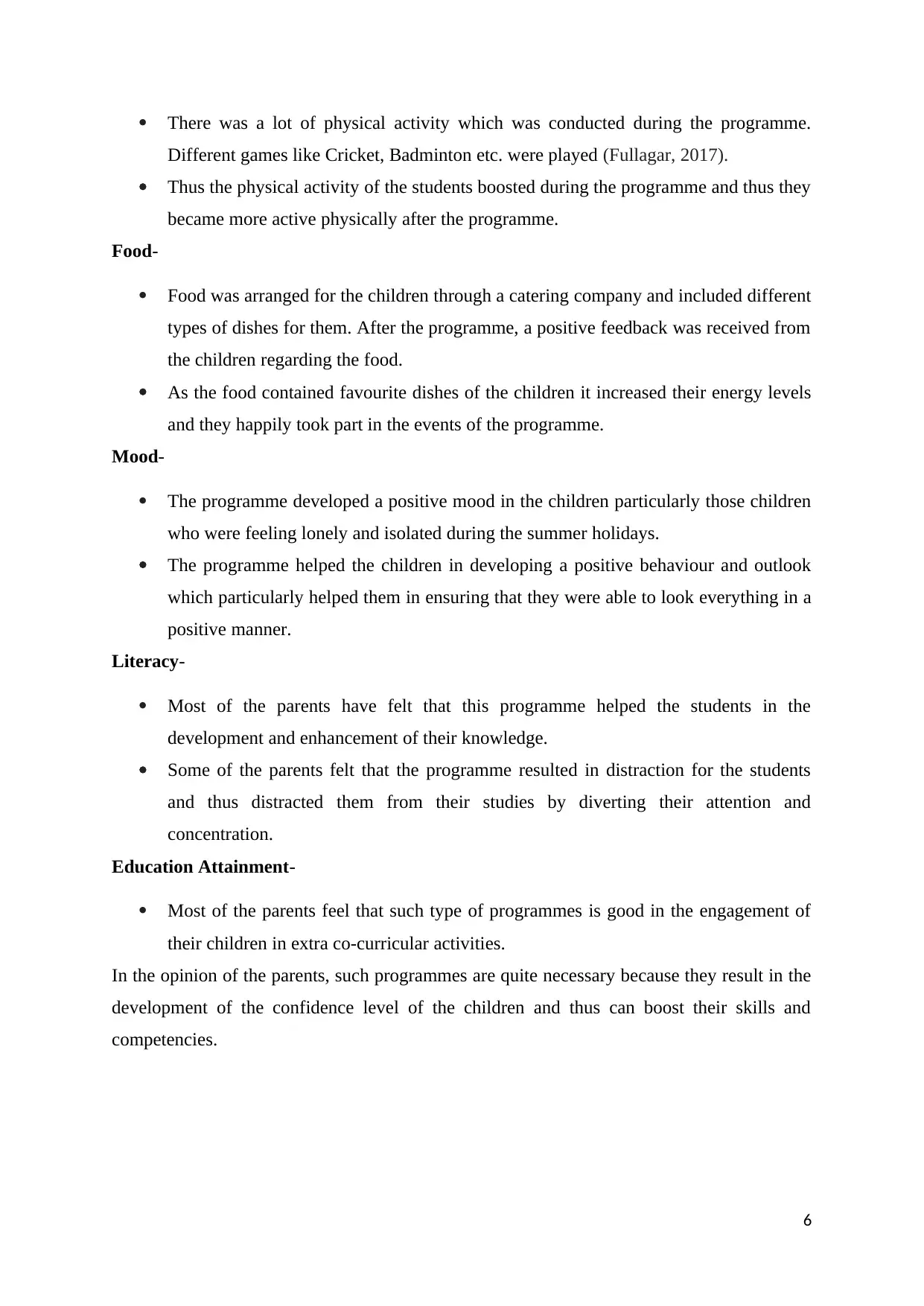
There was a lot of physical activity which was conducted during the programme.
Different games like Cricket, Badminton etc. were played (Fullagar, 2017).
Thus the physical activity of the students boosted during the programme and thus they
became more active physically after the programme.
Food-
Food was arranged for the children through a catering company and included different
types of dishes for them. After the programme, a positive feedback was received from
the children regarding the food.
As the food contained favourite dishes of the children it increased their energy levels
and they happily took part in the events of the programme.
Mood-
The programme developed a positive mood in the children particularly those children
who were feeling lonely and isolated during the summer holidays.
The programme helped the children in developing a positive behaviour and outlook
which particularly helped them in ensuring that they were able to look everything in a
positive manner.
Literacy-
Most of the parents have felt that this programme helped the students in the
development and enhancement of their knowledge.
Some of the parents felt that the programme resulted in distraction for the students
and thus distracted them from their studies by diverting their attention and
concentration.
Education Attainment-
Most of the parents feel that such type of programmes is good in the engagement of
their children in extra co-curricular activities.
In the opinion of the parents, such programmes are quite necessary because they result in the
development of the confidence level of the children and thus can boost their skills and
competencies.
6
Different games like Cricket, Badminton etc. were played (Fullagar, 2017).
Thus the physical activity of the students boosted during the programme and thus they
became more active physically after the programme.
Food-
Food was arranged for the children through a catering company and included different
types of dishes for them. After the programme, a positive feedback was received from
the children regarding the food.
As the food contained favourite dishes of the children it increased their energy levels
and they happily took part in the events of the programme.
Mood-
The programme developed a positive mood in the children particularly those children
who were feeling lonely and isolated during the summer holidays.
The programme helped the children in developing a positive behaviour and outlook
which particularly helped them in ensuring that they were able to look everything in a
positive manner.
Literacy-
Most of the parents have felt that this programme helped the students in the
development and enhancement of their knowledge.
Some of the parents felt that the programme resulted in distraction for the students
and thus distracted them from their studies by diverting their attention and
concentration.
Education Attainment-
Most of the parents feel that such type of programmes is good in the engagement of
their children in extra co-curricular activities.
In the opinion of the parents, such programmes are quite necessary because they result in the
development of the confidence level of the children and thus can boost their skills and
competencies.
6
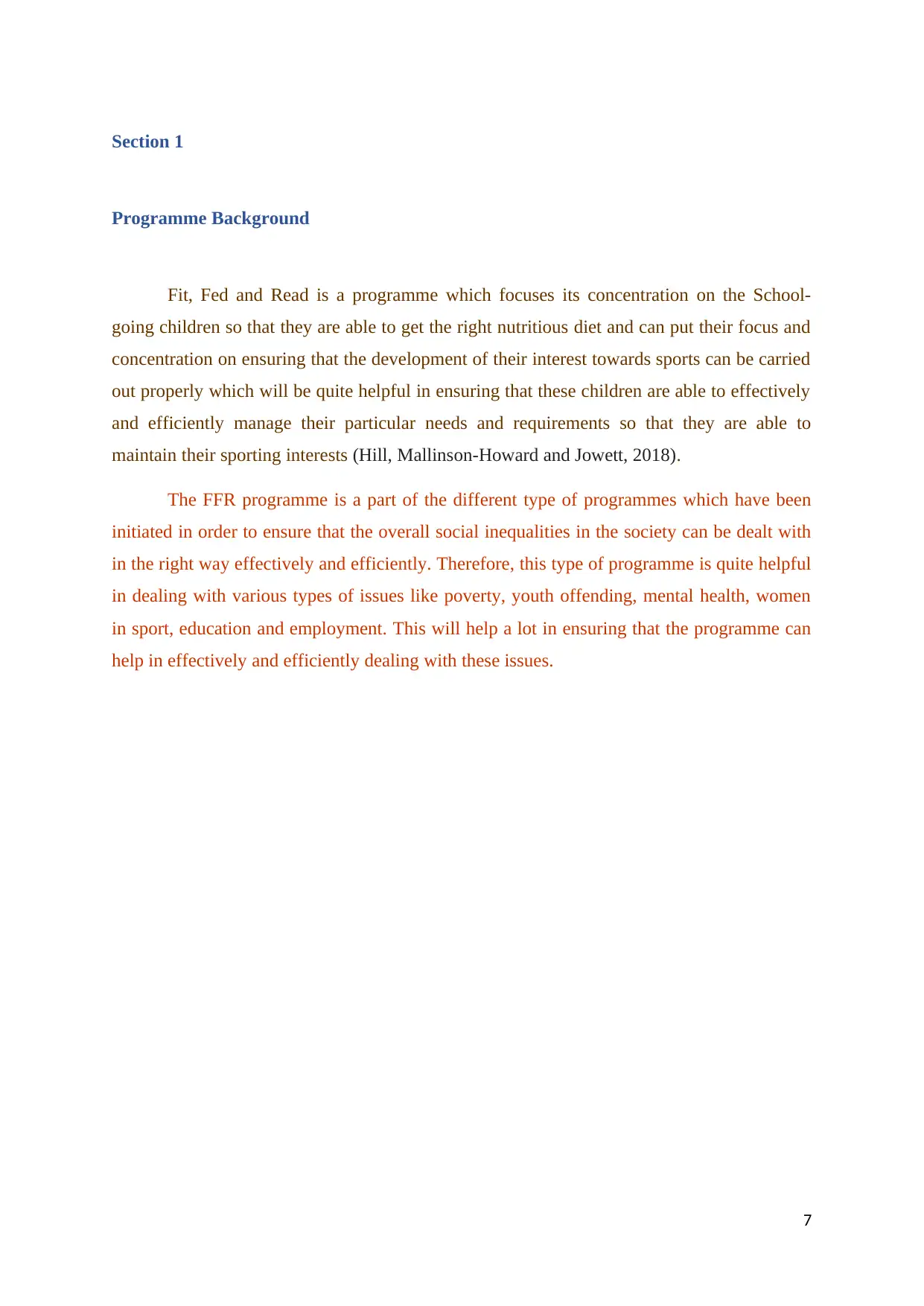
Section 1
Programme Background
Fit, Fed and Read is a programme which focuses its concentration on the School-
going children so that they are able to get the right nutritious diet and can put their focus and
concentration on ensuring that the development of their interest towards sports can be carried
out properly which will be quite helpful in ensuring that these children are able to effectively
and efficiently manage their particular needs and requirements so that they are able to
maintain their sporting interests (Hill, Mallinson-Howard and Jowett, 2018).
The FFR programme is a part of the different type of programmes which have been
initiated in order to ensure that the overall social inequalities in the society can be dealt with
in the right way effectively and efficiently. Therefore, this type of programme is quite helpful
in dealing with various types of issues like poverty, youth offending, mental health, women
in sport, education and employment. This will help a lot in ensuring that the programme can
help in effectively and efficiently dealing with these issues.
7
Programme Background
Fit, Fed and Read is a programme which focuses its concentration on the School-
going children so that they are able to get the right nutritious diet and can put their focus and
concentration on ensuring that the development of their interest towards sports can be carried
out properly which will be quite helpful in ensuring that these children are able to effectively
and efficiently manage their particular needs and requirements so that they are able to
maintain their sporting interests (Hill, Mallinson-Howard and Jowett, 2018).
The FFR programme is a part of the different type of programmes which have been
initiated in order to ensure that the overall social inequalities in the society can be dealt with
in the right way effectively and efficiently. Therefore, this type of programme is quite helpful
in dealing with various types of issues like poverty, youth offending, mental health, women
in sport, education and employment. This will help a lot in ensuring that the programme can
help in effectively and efficiently dealing with these issues.
7
Paraphrase This Document
Need a fresh take? Get an instant paraphrase of this document with our AI Paraphraser
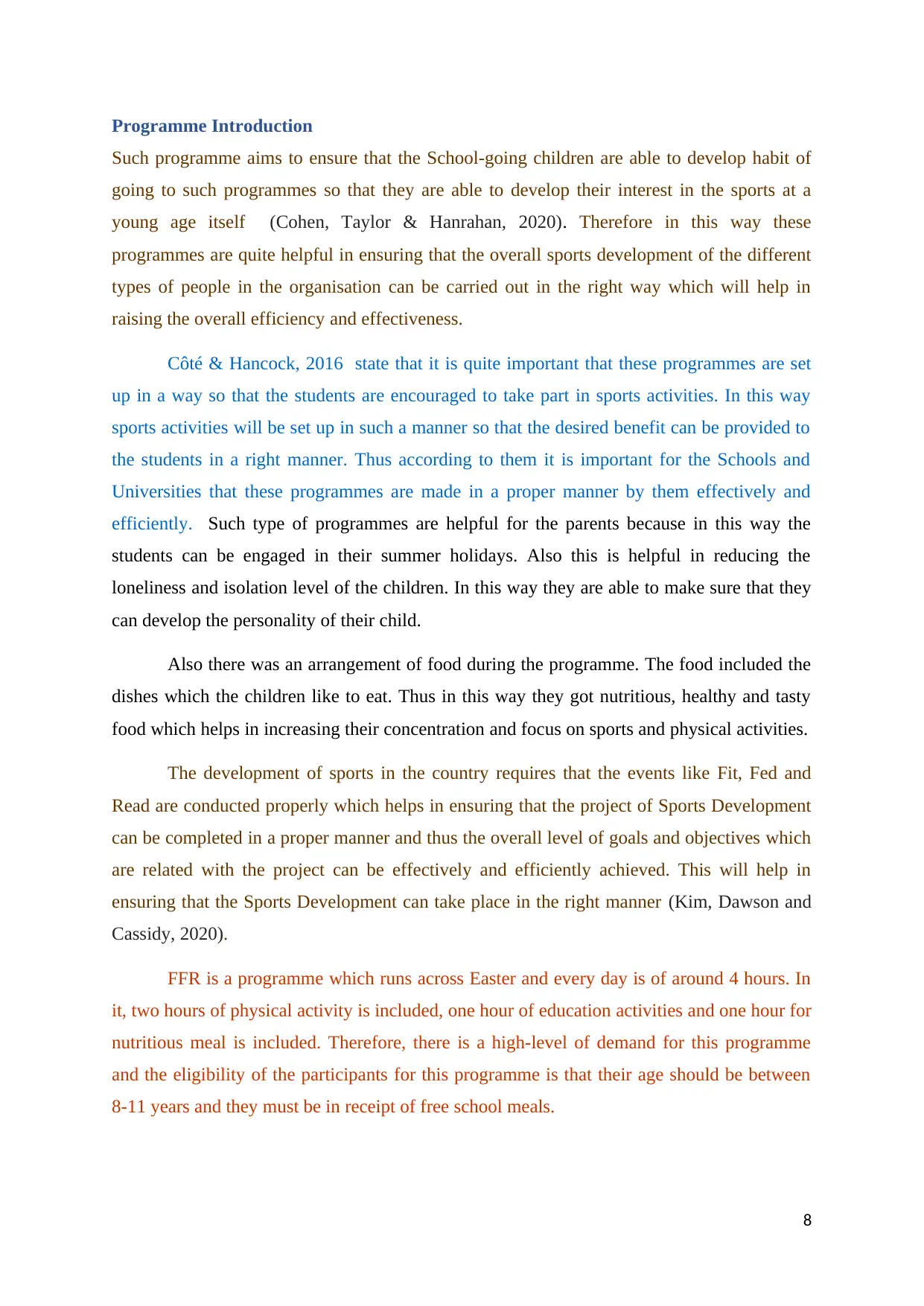
Programme Introduction
Such programme aims to ensure that the School-going children are able to develop habit of
going to such programmes so that they are able to develop their interest in the sports at a
young age itself (Cohen, Taylor & Hanrahan, 2020). Therefore in this way these
programmes are quite helpful in ensuring that the overall sports development of the different
types of people in the organisation can be carried out in the right way which will help in
raising the overall efficiency and effectiveness.
Côté & Hancock, 2016 state that it is quite important that these programmes are set
up in a way so that the students are encouraged to take part in sports activities. In this way
sports activities will be set up in such a manner so that the desired benefit can be provided to
the students in a right manner. Thus according to them it is important for the Schools and
Universities that these programmes are made in a proper manner by them effectively and
efficiently. Such type of programmes are helpful for the parents because in this way the
students can be engaged in their summer holidays. Also this is helpful in reducing the
loneliness and isolation level of the children. In this way they are able to make sure that they
can develop the personality of their child.
Also there was an arrangement of food during the programme. The food included the
dishes which the children like to eat. Thus in this way they got nutritious, healthy and tasty
food which helps in increasing their concentration and focus on sports and physical activities.
The development of sports in the country requires that the events like Fit, Fed and
Read are conducted properly which helps in ensuring that the project of Sports Development
can be completed in a proper manner and thus the overall level of goals and objectives which
are related with the project can be effectively and efficiently achieved. This will help in
ensuring that the Sports Development can take place in the right manner (Kim, Dawson and
Cassidy, 2020).
FFR is a programme which runs across Easter and every day is of around 4 hours. In
it, two hours of physical activity is included, one hour of education activities and one hour for
nutritious meal is included. Therefore, there is a high-level of demand for this programme
and the eligibility of the participants for this programme is that their age should be between
8-11 years and they must be in receipt of free school meals.
8
Such programme aims to ensure that the School-going children are able to develop habit of
going to such programmes so that they are able to develop their interest in the sports at a
young age itself (Cohen, Taylor & Hanrahan, 2020). Therefore in this way these
programmes are quite helpful in ensuring that the overall sports development of the different
types of people in the organisation can be carried out in the right way which will help in
raising the overall efficiency and effectiveness.
Côté & Hancock, 2016 state that it is quite important that these programmes are set
up in a way so that the students are encouraged to take part in sports activities. In this way
sports activities will be set up in such a manner so that the desired benefit can be provided to
the students in a right manner. Thus according to them it is important for the Schools and
Universities that these programmes are made in a proper manner by them effectively and
efficiently. Such type of programmes are helpful for the parents because in this way the
students can be engaged in their summer holidays. Also this is helpful in reducing the
loneliness and isolation level of the children. In this way they are able to make sure that they
can develop the personality of their child.
Also there was an arrangement of food during the programme. The food included the
dishes which the children like to eat. Thus in this way they got nutritious, healthy and tasty
food which helps in increasing their concentration and focus on sports and physical activities.
The development of sports in the country requires that the events like Fit, Fed and
Read are conducted properly which helps in ensuring that the project of Sports Development
can be completed in a proper manner and thus the overall level of goals and objectives which
are related with the project can be effectively and efficiently achieved. This will help in
ensuring that the Sports Development can take place in the right manner (Kim, Dawson and
Cassidy, 2020).
FFR is a programme which runs across Easter and every day is of around 4 hours. In
it, two hours of physical activity is included, one hour of education activities and one hour for
nutritious meal is included. Therefore, there is a high-level of demand for this programme
and the eligibility of the participants for this programme is that their age should be between
8-11 years and they must be in receipt of free school meals.
8
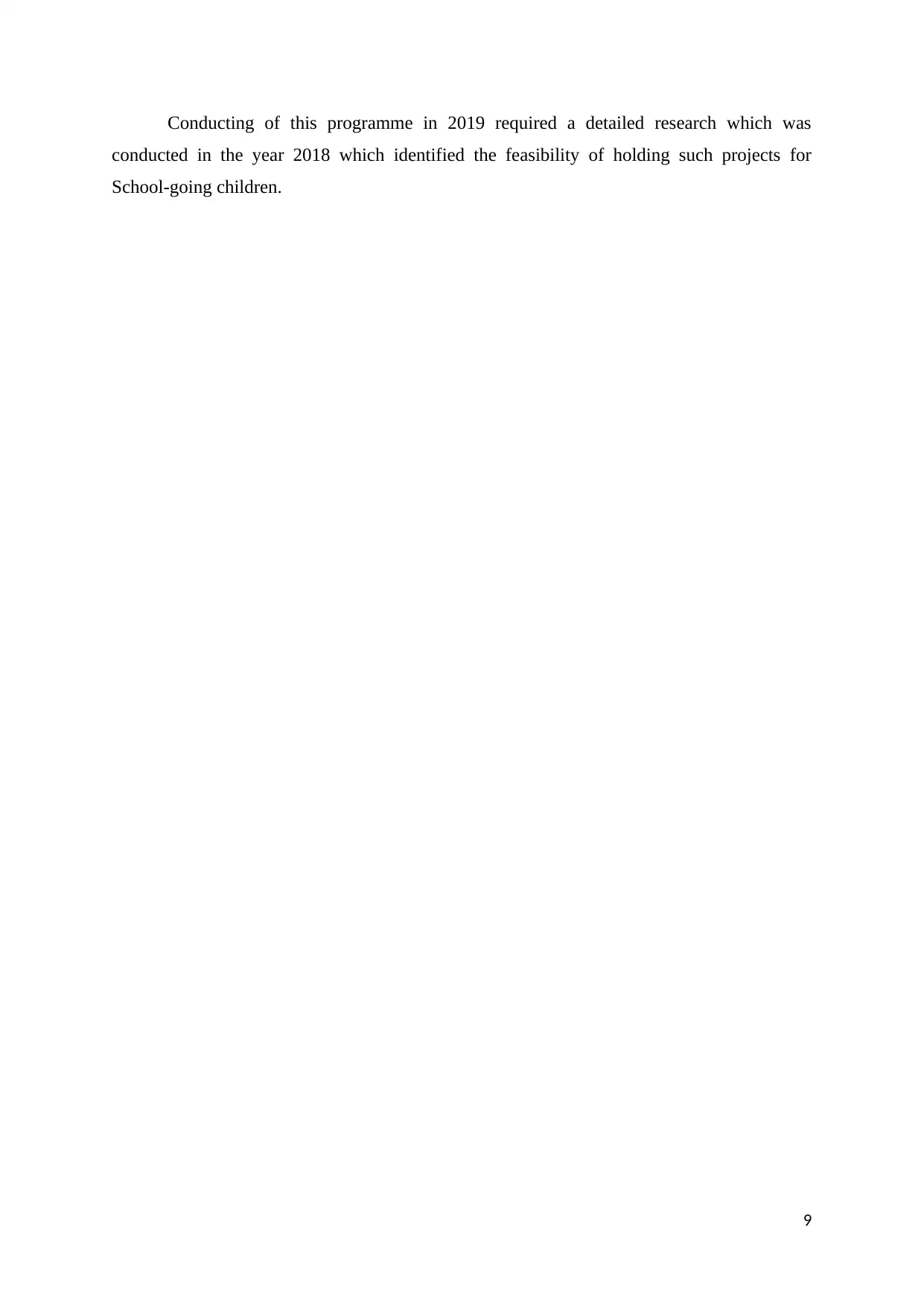
Conducting of this programme in 2019 required a detailed research which was
conducted in the year 2018 which identified the feasibility of holding such projects for
School-going children.
9
conducted in the year 2018 which identified the feasibility of holding such projects for
School-going children.
9
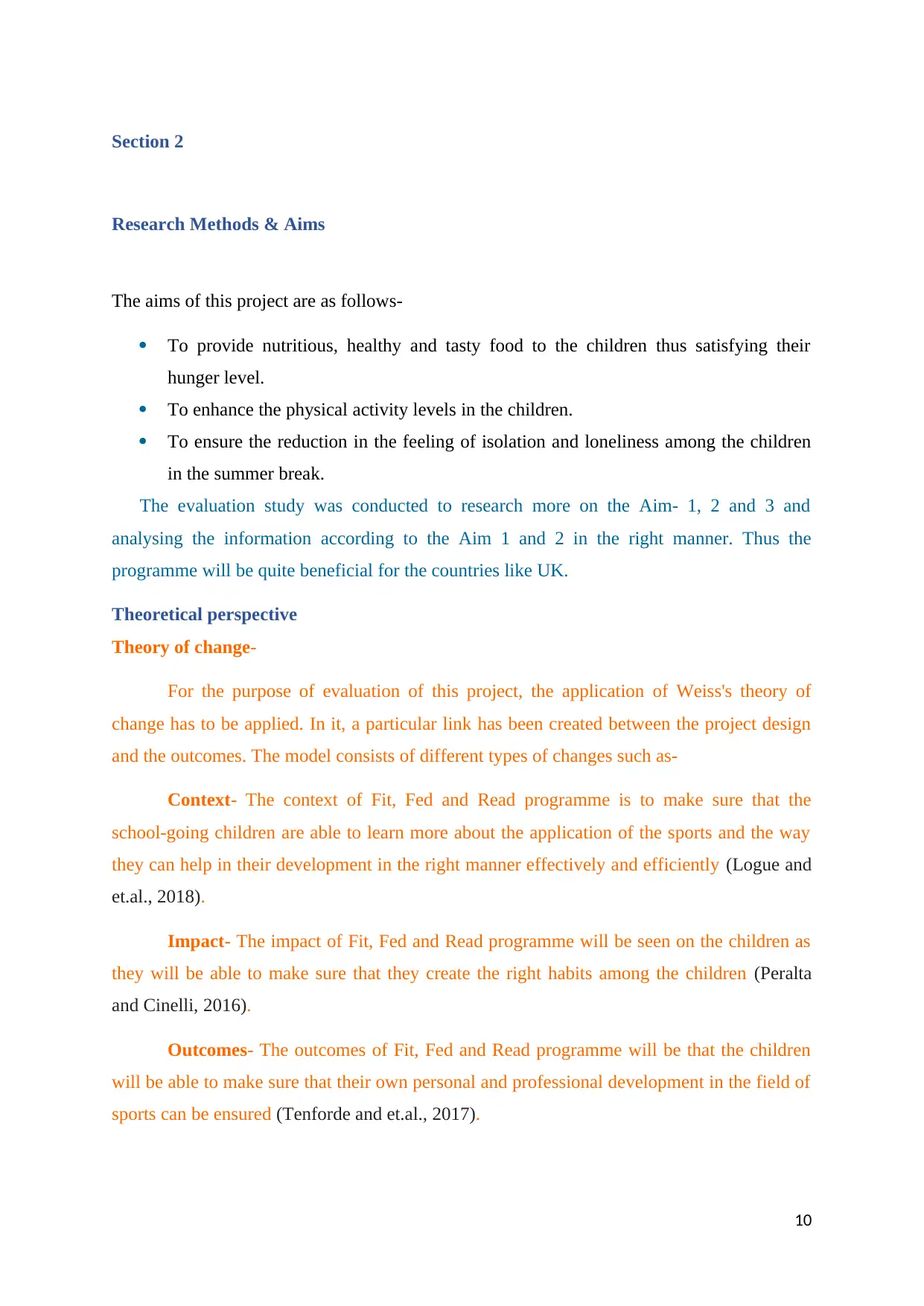
Section 2
Research Methods & Aims
The aims of this project are as follows-
To provide nutritious, healthy and tasty food to the children thus satisfying their
hunger level.
To enhance the physical activity levels in the children.
To ensure the reduction in the feeling of isolation and loneliness among the children
in the summer break.
The evaluation study was conducted to research more on the Aim- 1, 2 and 3 and
analysing the information according to the Aim 1 and 2 in the right manner. Thus the
programme will be quite beneficial for the countries like UK.
Theoretical perspective
Theory of change-
For the purpose of evaluation of this project, the application of Weiss's theory of
change has to be applied. In it, a particular link has been created between the project design
and the outcomes. The model consists of different types of changes such as-
Context- The context of Fit, Fed and Read programme is to make sure that the
school-going children are able to learn more about the application of the sports and the way
they can help in their development in the right manner effectively and efficiently (Logue and
et.al., 2018).
Impact- The impact of Fit, Fed and Read programme will be seen on the children as
they will be able to make sure that they create the right habits among the children (Peralta
and Cinelli, 2016).
Outcomes- The outcomes of Fit, Fed and Read programme will be that the children
will be able to make sure that their own personal and professional development in the field of
sports can be ensured (Tenforde and et.al., 2017).
10
Research Methods & Aims
The aims of this project are as follows-
To provide nutritious, healthy and tasty food to the children thus satisfying their
hunger level.
To enhance the physical activity levels in the children.
To ensure the reduction in the feeling of isolation and loneliness among the children
in the summer break.
The evaluation study was conducted to research more on the Aim- 1, 2 and 3 and
analysing the information according to the Aim 1 and 2 in the right manner. Thus the
programme will be quite beneficial for the countries like UK.
Theoretical perspective
Theory of change-
For the purpose of evaluation of this project, the application of Weiss's theory of
change has to be applied. In it, a particular link has been created between the project design
and the outcomes. The model consists of different types of changes such as-
Context- The context of Fit, Fed and Read programme is to make sure that the
school-going children are able to learn more about the application of the sports and the way
they can help in their development in the right manner effectively and efficiently (Logue and
et.al., 2018).
Impact- The impact of Fit, Fed and Read programme will be seen on the children as
they will be able to make sure that they create the right habits among the children (Peralta
and Cinelli, 2016).
Outcomes- The outcomes of Fit, Fed and Read programme will be that the children
will be able to make sure that their own personal and professional development in the field of
sports can be ensured (Tenforde and et.al., 2017).
10
Secure Best Marks with AI Grader
Need help grading? Try our AI Grader for instant feedback on your assignments.
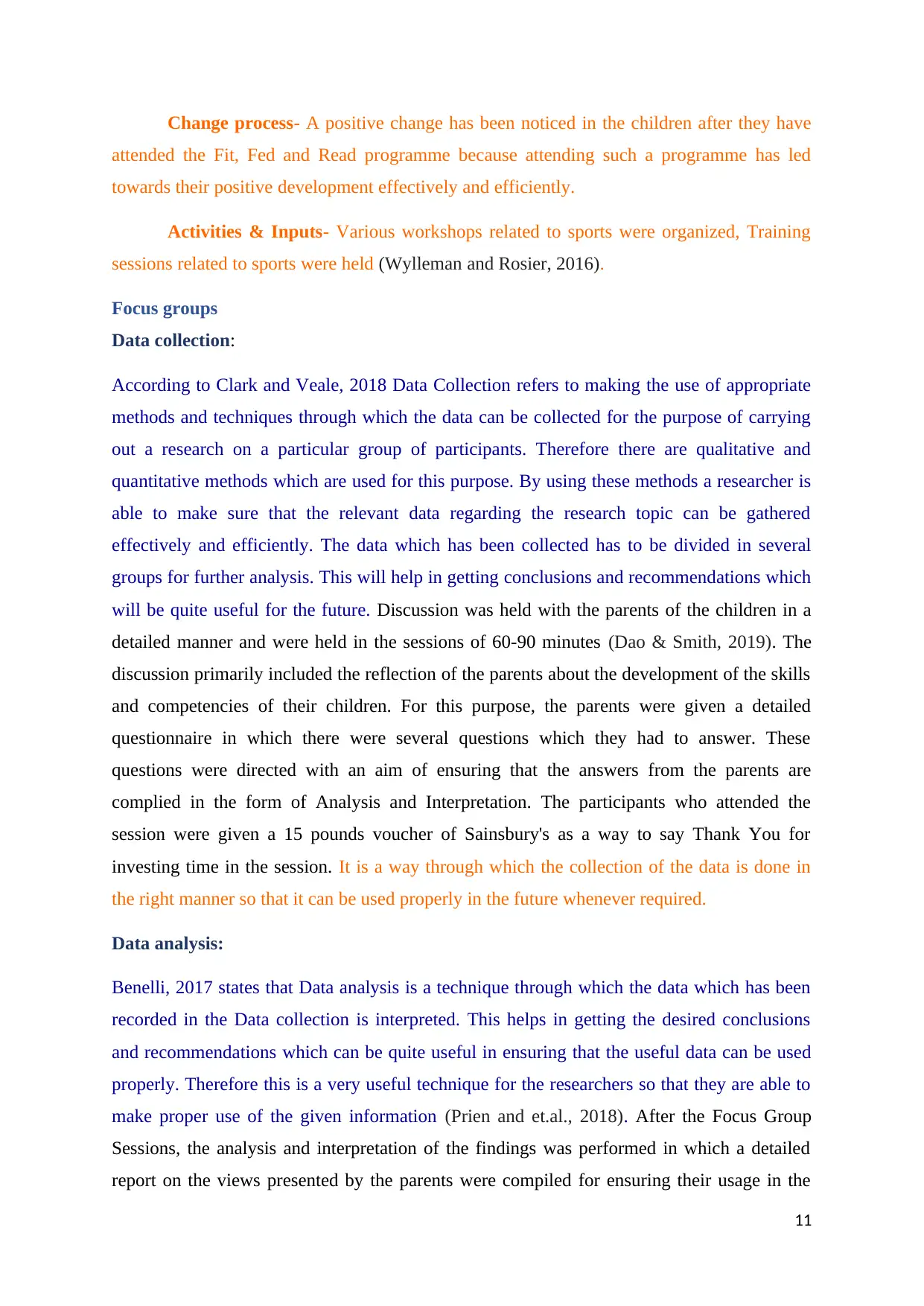
Change process- A positive change has been noticed in the children after they have
attended the Fit, Fed and Read programme because attending such a programme has led
towards their positive development effectively and efficiently.
Activities & Inputs- Various workshops related to sports were organized, Training
sessions related to sports were held (Wylleman and Rosier, 2016).
Focus groups
Data collection:
According to Clark and Veale, 2018 Data Collection refers to making the use of appropriate
methods and techniques through which the data can be collected for the purpose of carrying
out a research on a particular group of participants. Therefore there are qualitative and
quantitative methods which are used for this purpose. By using these methods a researcher is
able to make sure that the relevant data regarding the research topic can be gathered
effectively and efficiently. The data which has been collected has to be divided in several
groups for further analysis. This will help in getting conclusions and recommendations which
will be quite useful for the future. Discussion was held with the parents of the children in a
detailed manner and were held in the sessions of 60-90 minutes (Dao & Smith, 2019). The
discussion primarily included the reflection of the parents about the development of the skills
and competencies of their children. For this purpose, the parents were given a detailed
questionnaire in which there were several questions which they had to answer. These
questions were directed with an aim of ensuring that the answers from the parents are
complied in the form of Analysis and Interpretation. The participants who attended the
session were given a 15 pounds voucher of Sainsbury's as a way to say Thank You for
investing time in the session. It is a way through which the collection of the data is done in
the right manner so that it can be used properly in the future whenever required.
Data analysis:
Benelli, 2017 states that Data analysis is a technique through which the data which has been
recorded in the Data collection is interpreted. This helps in getting the desired conclusions
and recommendations which can be quite useful in ensuring that the useful data can be used
properly. Therefore this is a very useful technique for the researchers so that they are able to
make proper use of the given information (Prien and et.al., 2018). After the Focus Group
Sessions, the analysis and interpretation of the findings was performed in which a detailed
report on the views presented by the parents were compiled for ensuring their usage in the
11
attended the Fit, Fed and Read programme because attending such a programme has led
towards their positive development effectively and efficiently.
Activities & Inputs- Various workshops related to sports were organized, Training
sessions related to sports were held (Wylleman and Rosier, 2016).
Focus groups
Data collection:
According to Clark and Veale, 2018 Data Collection refers to making the use of appropriate
methods and techniques through which the data can be collected for the purpose of carrying
out a research on a particular group of participants. Therefore there are qualitative and
quantitative methods which are used for this purpose. By using these methods a researcher is
able to make sure that the relevant data regarding the research topic can be gathered
effectively and efficiently. The data which has been collected has to be divided in several
groups for further analysis. This will help in getting conclusions and recommendations which
will be quite useful for the future. Discussion was held with the parents of the children in a
detailed manner and were held in the sessions of 60-90 minutes (Dao & Smith, 2019). The
discussion primarily included the reflection of the parents about the development of the skills
and competencies of their children. For this purpose, the parents were given a detailed
questionnaire in which there were several questions which they had to answer. These
questions were directed with an aim of ensuring that the answers from the parents are
complied in the form of Analysis and Interpretation. The participants who attended the
session were given a 15 pounds voucher of Sainsbury's as a way to say Thank You for
investing time in the session. It is a way through which the collection of the data is done in
the right manner so that it can be used properly in the future whenever required.
Data analysis:
Benelli, 2017 states that Data analysis is a technique through which the data which has been
recorded in the Data collection is interpreted. This helps in getting the desired conclusions
and recommendations which can be quite useful in ensuring that the useful data can be used
properly. Therefore this is a very useful technique for the researchers so that they are able to
make proper use of the given information (Prien and et.al., 2018). After the Focus Group
Sessions, the analysis and interpretation of the findings was performed in which a detailed
report on the views presented by the parents were compiled for ensuring their usage in the
11
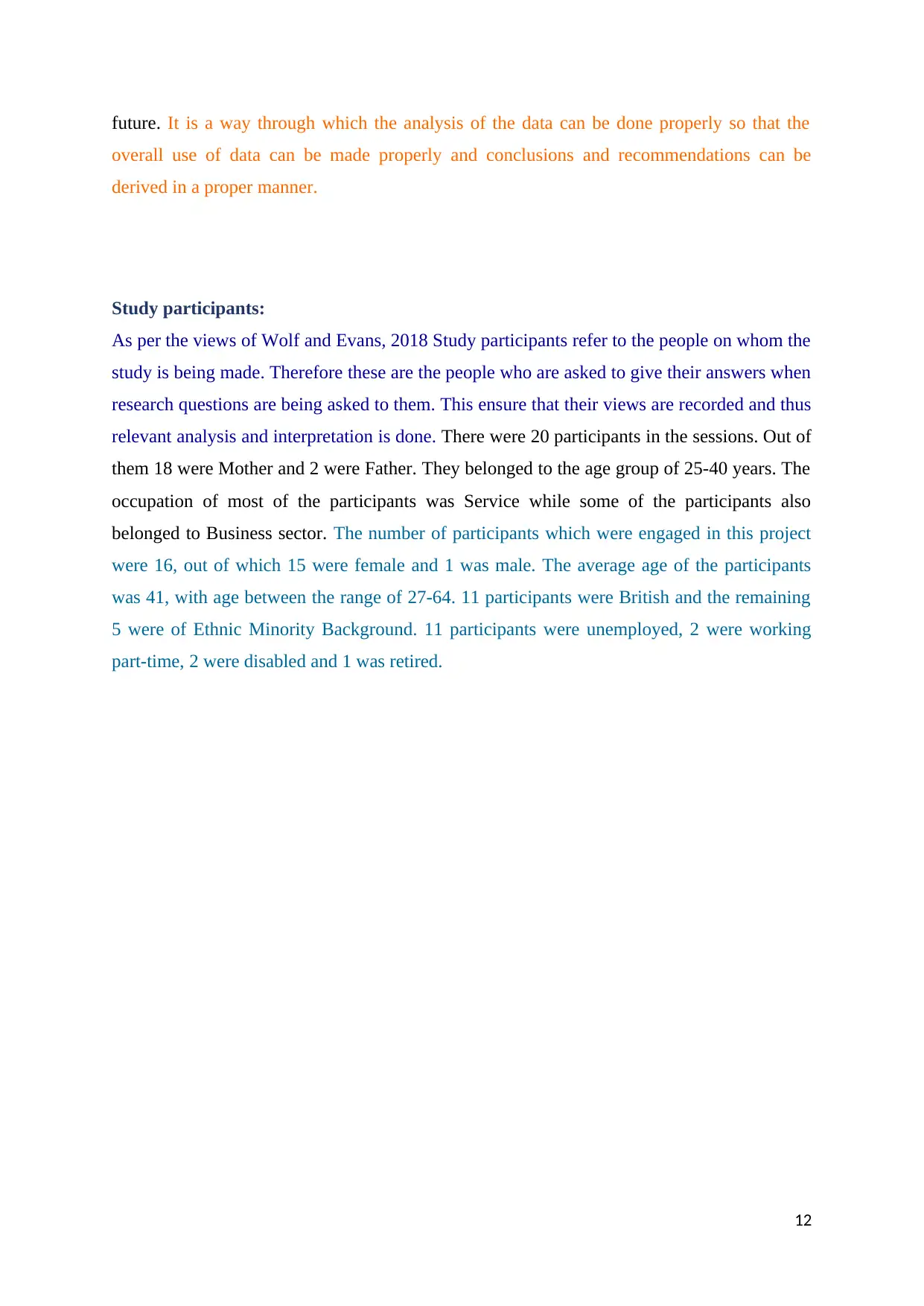
future. It is a way through which the analysis of the data can be done properly so that the
overall use of data can be made properly and conclusions and recommendations can be
derived in a proper manner.
Study participants:
As per the views of Wolf and Evans, 2018 Study participants refer to the people on whom the
study is being made. Therefore these are the people who are asked to give their answers when
research questions are being asked to them. This ensure that their views are recorded and thus
relevant analysis and interpretation is done. There were 20 participants in the sessions. Out of
them 18 were Mother and 2 were Father. They belonged to the age group of 25-40 years. The
occupation of most of the participants was Service while some of the participants also
belonged to Business sector. The number of participants which were engaged in this project
were 16, out of which 15 were female and 1 was male. The average age of the participants
was 41, with age between the range of 27-64. 11 participants were British and the remaining
5 were of Ethnic Minority Background. 11 participants were unemployed, 2 were working
part-time, 2 were disabled and 1 was retired.
12
overall use of data can be made properly and conclusions and recommendations can be
derived in a proper manner.
Study participants:
As per the views of Wolf and Evans, 2018 Study participants refer to the people on whom the
study is being made. Therefore these are the people who are asked to give their answers when
research questions are being asked to them. This ensure that their views are recorded and thus
relevant analysis and interpretation is done. There were 20 participants in the sessions. Out of
them 18 were Mother and 2 were Father. They belonged to the age group of 25-40 years. The
occupation of most of the participants was Service while some of the participants also
belonged to Business sector. The number of participants which were engaged in this project
were 16, out of which 15 were female and 1 was male. The average age of the participants
was 41, with age between the range of 27-64. 11 participants were British and the remaining
5 were of Ethnic Minority Background. 11 participants were unemployed, 2 were working
part-time, 2 were disabled and 1 was retired.
12
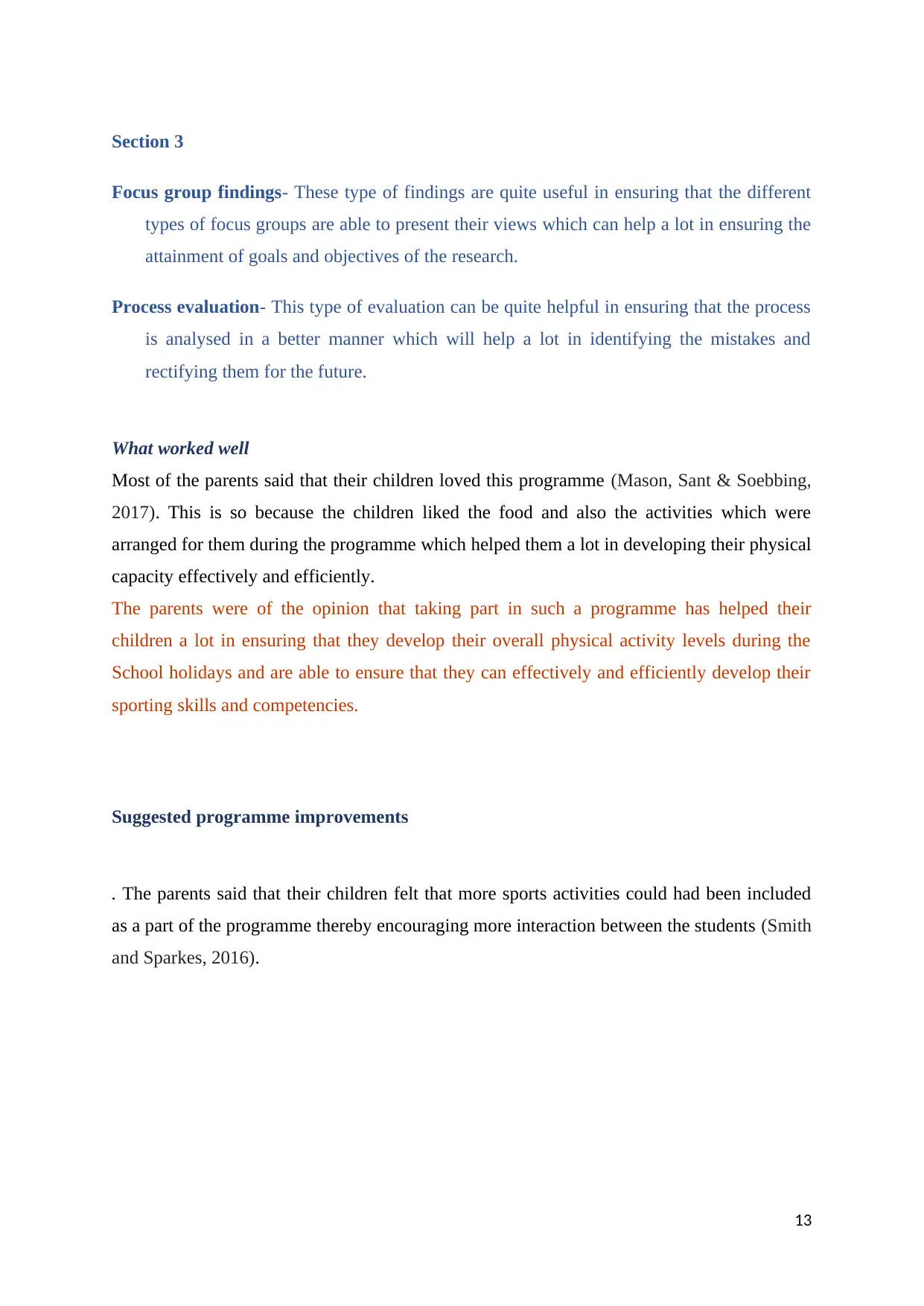
Section 3
Focus group findings- These type of findings are quite useful in ensuring that the different
types of focus groups are able to present their views which can help a lot in ensuring the
attainment of goals and objectives of the research.
Process evaluation- This type of evaluation can be quite helpful in ensuring that the process
is analysed in a better manner which will help a lot in identifying the mistakes and
rectifying them for the future.
What worked well
Most of the parents said that their children loved this programme (Mason, Sant & Soebbing,
2017). This is so because the children liked the food and also the activities which were
arranged for them during the programme which helped them a lot in developing their physical
capacity effectively and efficiently.
The parents were of the opinion that taking part in such a programme has helped their
children a lot in ensuring that they develop their overall physical activity levels during the
School holidays and are able to ensure that they can effectively and efficiently develop their
sporting skills and competencies.
Suggested programme improvements
. The parents said that their children felt that more sports activities could had been included
as a part of the programme thereby encouraging more interaction between the students (Smith
and Sparkes, 2016).
13
Focus group findings- These type of findings are quite useful in ensuring that the different
types of focus groups are able to present their views which can help a lot in ensuring the
attainment of goals and objectives of the research.
Process evaluation- This type of evaluation can be quite helpful in ensuring that the process
is analysed in a better manner which will help a lot in identifying the mistakes and
rectifying them for the future.
What worked well
Most of the parents said that their children loved this programme (Mason, Sant & Soebbing,
2017). This is so because the children liked the food and also the activities which were
arranged for them during the programme which helped them a lot in developing their physical
capacity effectively and efficiently.
The parents were of the opinion that taking part in such a programme has helped their
children a lot in ensuring that they develop their overall physical activity levels during the
School holidays and are able to ensure that they can effectively and efficiently develop their
sporting skills and competencies.
Suggested programme improvements
. The parents said that their children felt that more sports activities could had been included
as a part of the programme thereby encouraging more interaction between the students (Smith
and Sparkes, 2016).
13
Paraphrase This Document
Need a fresh take? Get an instant paraphrase of this document with our AI Paraphraser
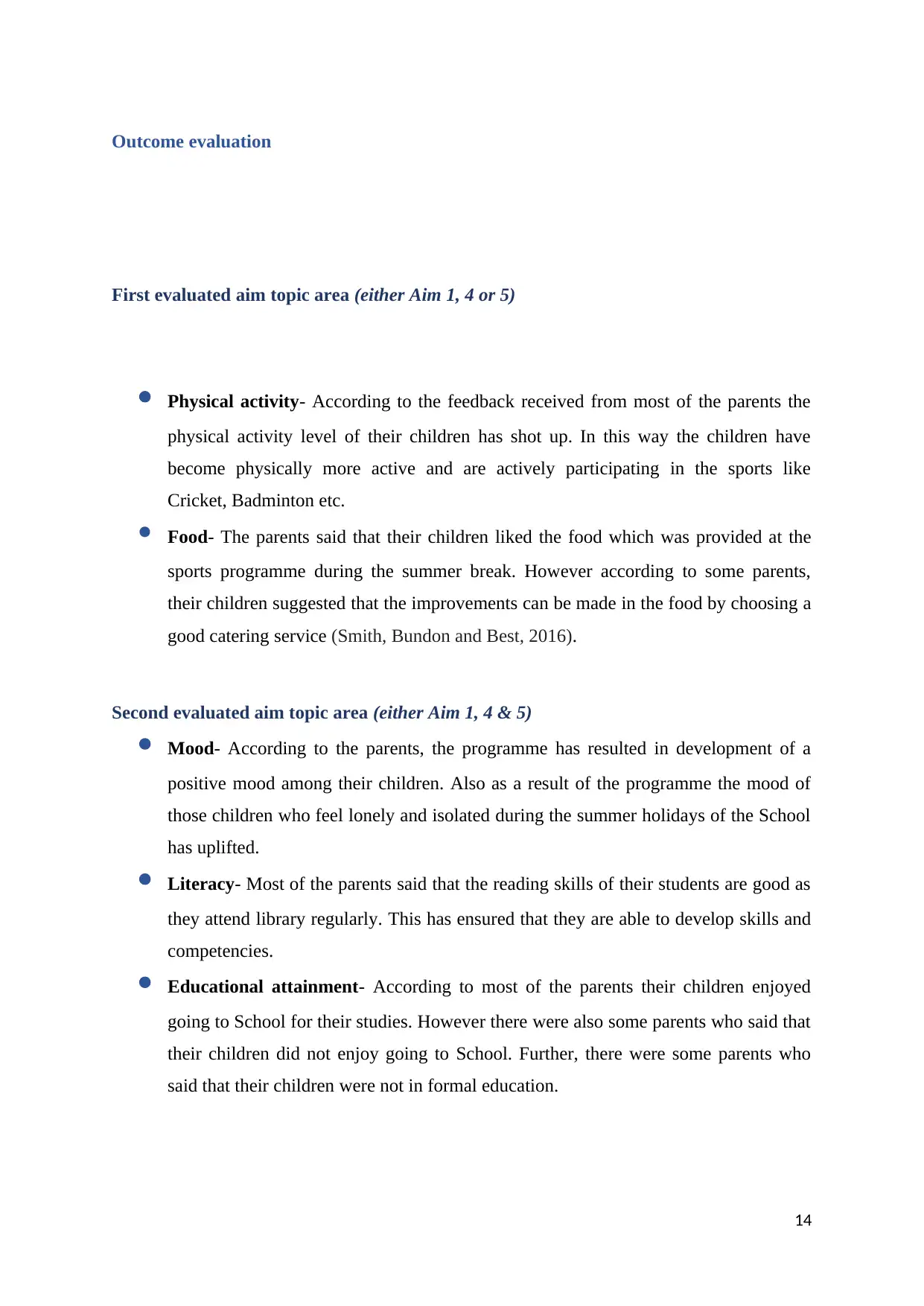
Outcome evaluation
First evaluated aim topic area (either Aim 1, 4 or 5)
Physical activity- According to the feedback received from most of the parents the
physical activity level of their children has shot up. In this way the children have
become physically more active and are actively participating in the sports like
Cricket, Badminton etc.
Food- The parents said that their children liked the food which was provided at the
sports programme during the summer break. However according to some parents,
their children suggested that the improvements can be made in the food by choosing a
good catering service (Smith, Bundon and Best, 2016).
Second evaluated aim topic area (either Aim 1, 4 & 5)
Mood- According to the parents, the programme has resulted in development of a
positive mood among their children. Also as a result of the programme the mood of
those children who feel lonely and isolated during the summer holidays of the School
has uplifted.
Literacy- Most of the parents said that the reading skills of their students are good as
they attend library regularly. This has ensured that they are able to develop skills and
competencies.
Educational attainment- According to most of the parents their children enjoyed
going to School for their studies. However there were also some parents who said that
their children did not enjoy going to School. Further, there were some parents who
said that their children were not in formal education.
14
First evaluated aim topic area (either Aim 1, 4 or 5)
Physical activity- According to the feedback received from most of the parents the
physical activity level of their children has shot up. In this way the children have
become physically more active and are actively participating in the sports like
Cricket, Badminton etc.
Food- The parents said that their children liked the food which was provided at the
sports programme during the summer break. However according to some parents,
their children suggested that the improvements can be made in the food by choosing a
good catering service (Smith, Bundon and Best, 2016).
Second evaluated aim topic area (either Aim 1, 4 & 5)
Mood- According to the parents, the programme has resulted in development of a
positive mood among their children. Also as a result of the programme the mood of
those children who feel lonely and isolated during the summer holidays of the School
has uplifted.
Literacy- Most of the parents said that the reading skills of their students are good as
they attend library regularly. This has ensured that they are able to develop skills and
competencies.
Educational attainment- According to most of the parents their children enjoyed
going to School for their studies. However there were also some parents who said that
their children did not enjoy going to School. Further, there were some parents who
said that their children were not in formal education.
14
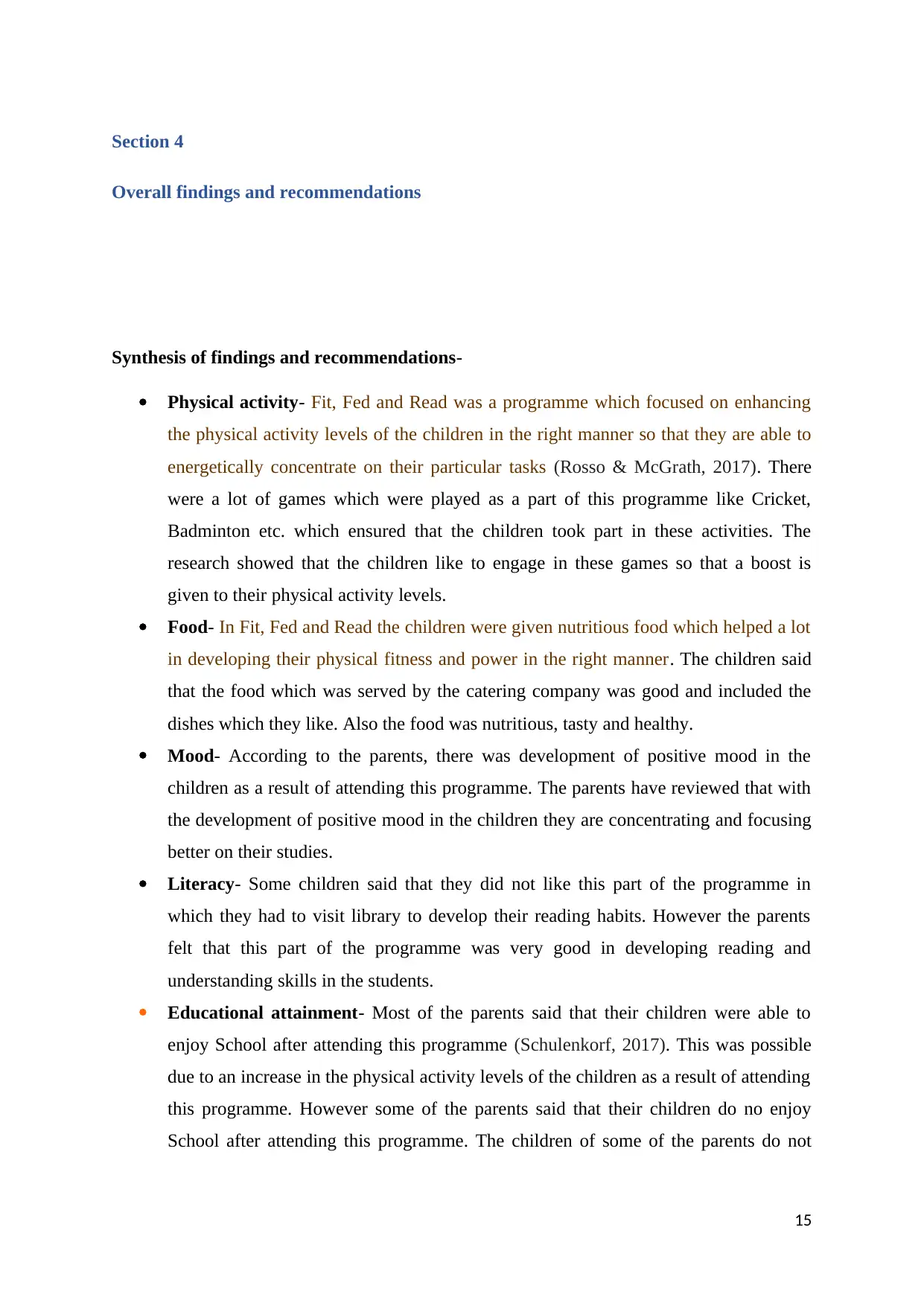
Section 4
Overall findings and recommendations
Synthesis of findings and recommendations-
Physical activity- Fit, Fed and Read was a programme which focused on enhancing
the physical activity levels of the children in the right manner so that they are able to
energetically concentrate on their particular tasks (Rosso & McGrath, 2017). There
were a lot of games which were played as a part of this programme like Cricket,
Badminton etc. which ensured that the children took part in these activities. The
research showed that the children like to engage in these games so that a boost is
given to their physical activity levels.
Food- In Fit, Fed and Read the children were given nutritious food which helped a lot
in developing their physical fitness and power in the right manner. The children said
that the food which was served by the catering company was good and included the
dishes which they like. Also the food was nutritious, tasty and healthy.
Mood- According to the parents, there was development of positive mood in the
children as a result of attending this programme. The parents have reviewed that with
the development of positive mood in the children they are concentrating and focusing
better on their studies.
Literacy- Some children said that they did not like this part of the programme in
which they had to visit library to develop their reading habits. However the parents
felt that this part of the programme was very good in developing reading and
understanding skills in the students.
Educational attainment- Most of the parents said that their children were able to
enjoy School after attending this programme (Schulenkorf, 2017). This was possible
due to an increase in the physical activity levels of the children as a result of attending
this programme. However some of the parents said that their children do no enjoy
School after attending this programme. The children of some of the parents do not
15
Overall findings and recommendations
Synthesis of findings and recommendations-
Physical activity- Fit, Fed and Read was a programme which focused on enhancing
the physical activity levels of the children in the right manner so that they are able to
energetically concentrate on their particular tasks (Rosso & McGrath, 2017). There
were a lot of games which were played as a part of this programme like Cricket,
Badminton etc. which ensured that the children took part in these activities. The
research showed that the children like to engage in these games so that a boost is
given to their physical activity levels.
Food- In Fit, Fed and Read the children were given nutritious food which helped a lot
in developing their physical fitness and power in the right manner. The children said
that the food which was served by the catering company was good and included the
dishes which they like. Also the food was nutritious, tasty and healthy.
Mood- According to the parents, there was development of positive mood in the
children as a result of attending this programme. The parents have reviewed that with
the development of positive mood in the children they are concentrating and focusing
better on their studies.
Literacy- Some children said that they did not like this part of the programme in
which they had to visit library to develop their reading habits. However the parents
felt that this part of the programme was very good in developing reading and
understanding skills in the students.
Educational attainment- Most of the parents said that their children were able to
enjoy School after attending this programme (Schulenkorf, 2017). This was possible
due to an increase in the physical activity levels of the children as a result of attending
this programme. However some of the parents said that their children do no enjoy
School after attending this programme. The children of some of the parents do not
15
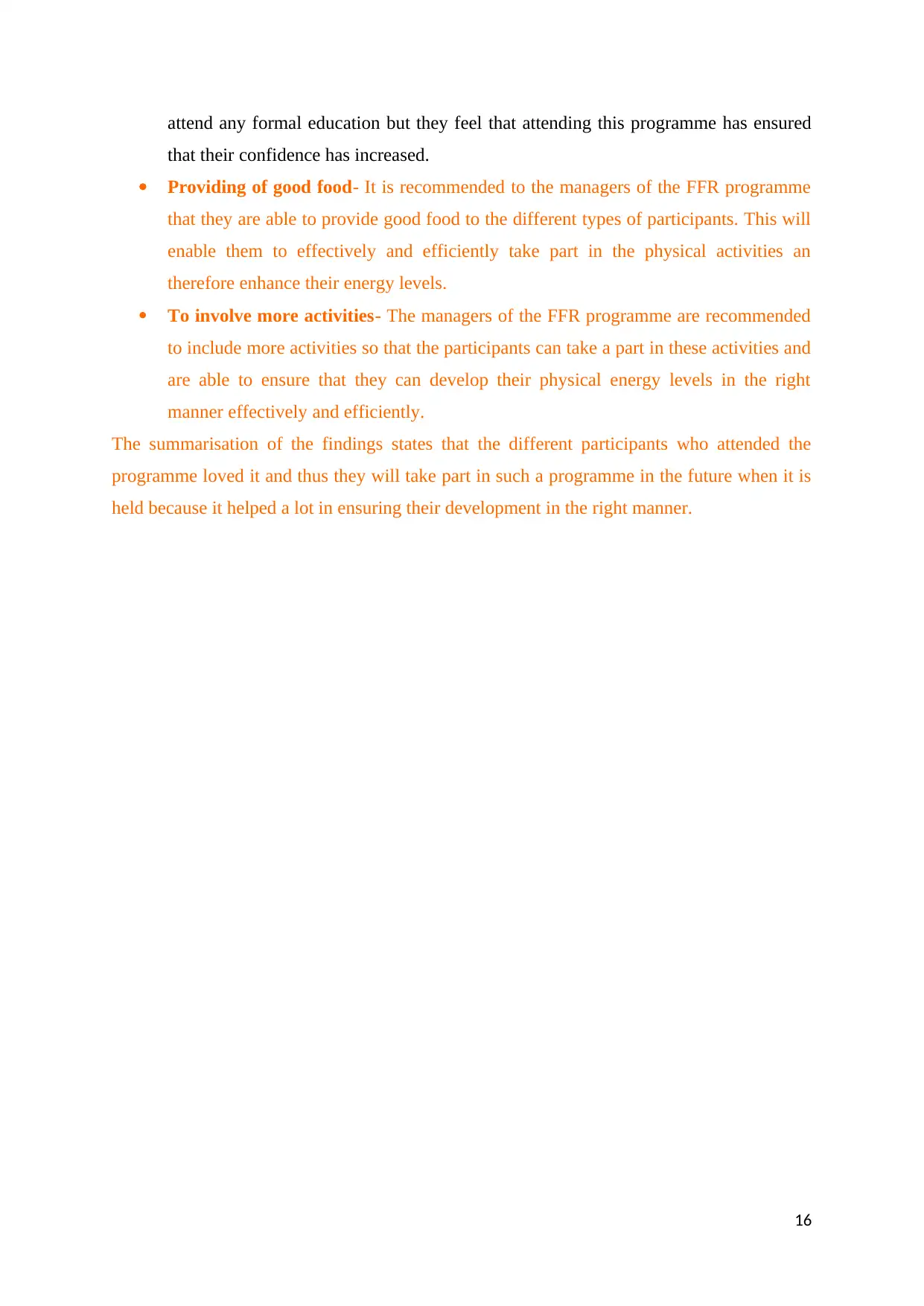
attend any formal education but they feel that attending this programme has ensured
that their confidence has increased.
Providing of good food- It is recommended to the managers of the FFR programme
that they are able to provide good food to the different types of participants. This will
enable them to effectively and efficiently take part in the physical activities an
therefore enhance their energy levels.
To involve more activities- The managers of the FFR programme are recommended
to include more activities so that the participants can take a part in these activities and
are able to ensure that they can develop their physical energy levels in the right
manner effectively and efficiently.
The summarisation of the findings states that the different participants who attended the
programme loved it and thus they will take part in such a programme in the future when it is
held because it helped a lot in ensuring their development in the right manner.
16
that their confidence has increased.
Providing of good food- It is recommended to the managers of the FFR programme
that they are able to provide good food to the different types of participants. This will
enable them to effectively and efficiently take part in the physical activities an
therefore enhance their energy levels.
To involve more activities- The managers of the FFR programme are recommended
to include more activities so that the participants can take a part in these activities and
are able to ensure that they can develop their physical energy levels in the right
manner effectively and efficiently.
The summarisation of the findings states that the different participants who attended the
programme loved it and thus they will take part in such a programme in the future when it is
held because it helped a lot in ensuring their development in the right manner.
16
Secure Best Marks with AI Grader
Need help grading? Try our AI Grader for instant feedback on your assignments.
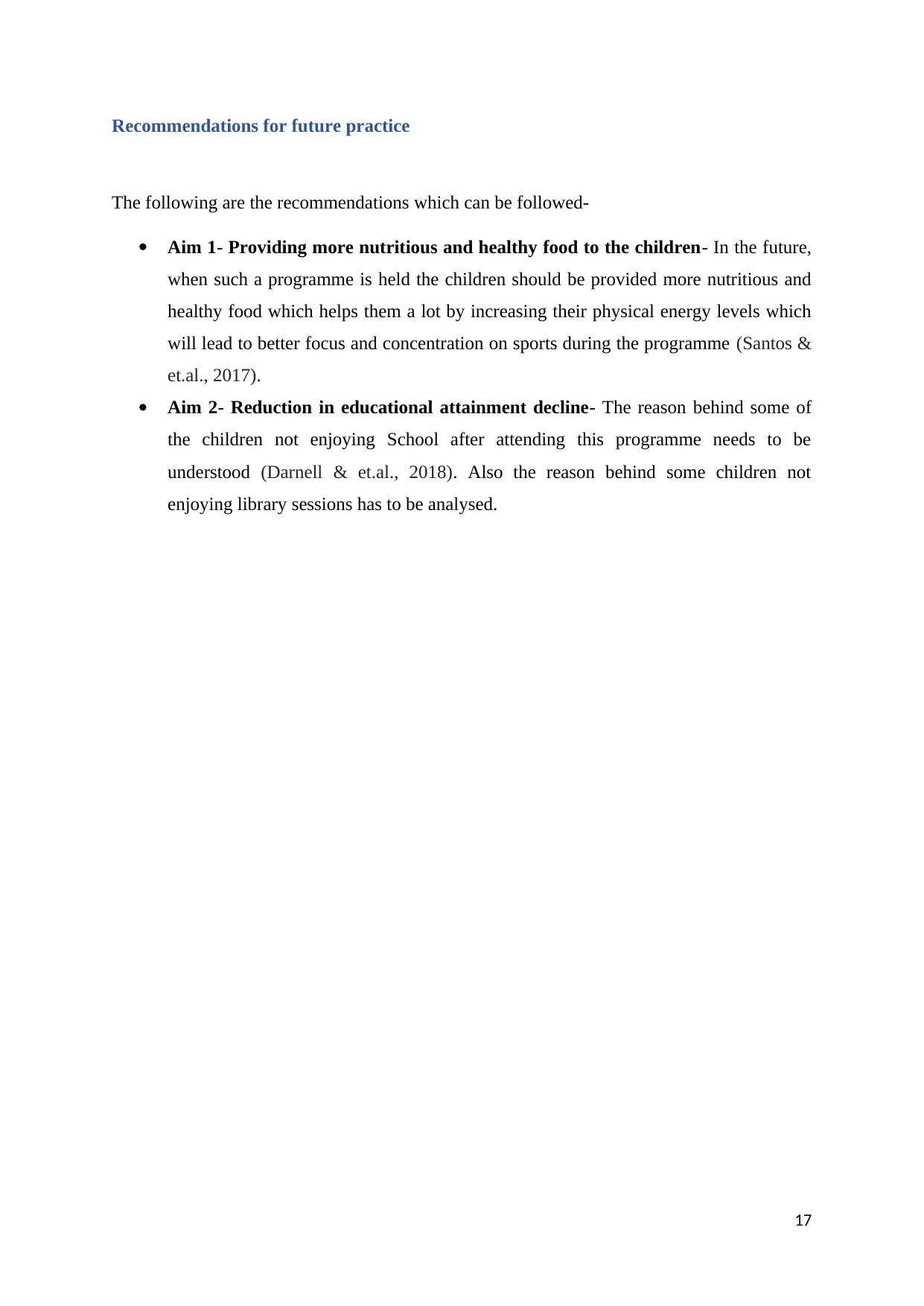
Recommendations for future practice
The following are the recommendations which can be followed-
Aim 1- Providing more nutritious and healthy food to the children- In the future,
when such a programme is held the children should be provided more nutritious and
healthy food which helps them a lot by increasing their physical energy levels which
will lead to better focus and concentration on sports during the programme (Santos &
et.al., 2017).
Aim 2- Reduction in educational attainment decline- The reason behind some of
the children not enjoying School after attending this programme needs to be
understood (Darnell & et.al., 2018). Also the reason behind some children not
enjoying library sessions has to be analysed.
17
The following are the recommendations which can be followed-
Aim 1- Providing more nutritious and healthy food to the children- In the future,
when such a programme is held the children should be provided more nutritious and
healthy food which helps them a lot by increasing their physical energy levels which
will lead to better focus and concentration on sports during the programme (Santos &
et.al., 2017).
Aim 2- Reduction in educational attainment decline- The reason behind some of
the children not enjoying School after attending this programme needs to be
understood (Darnell & et.al., 2018). Also the reason behind some children not
enjoying library sessions has to be analysed.
17
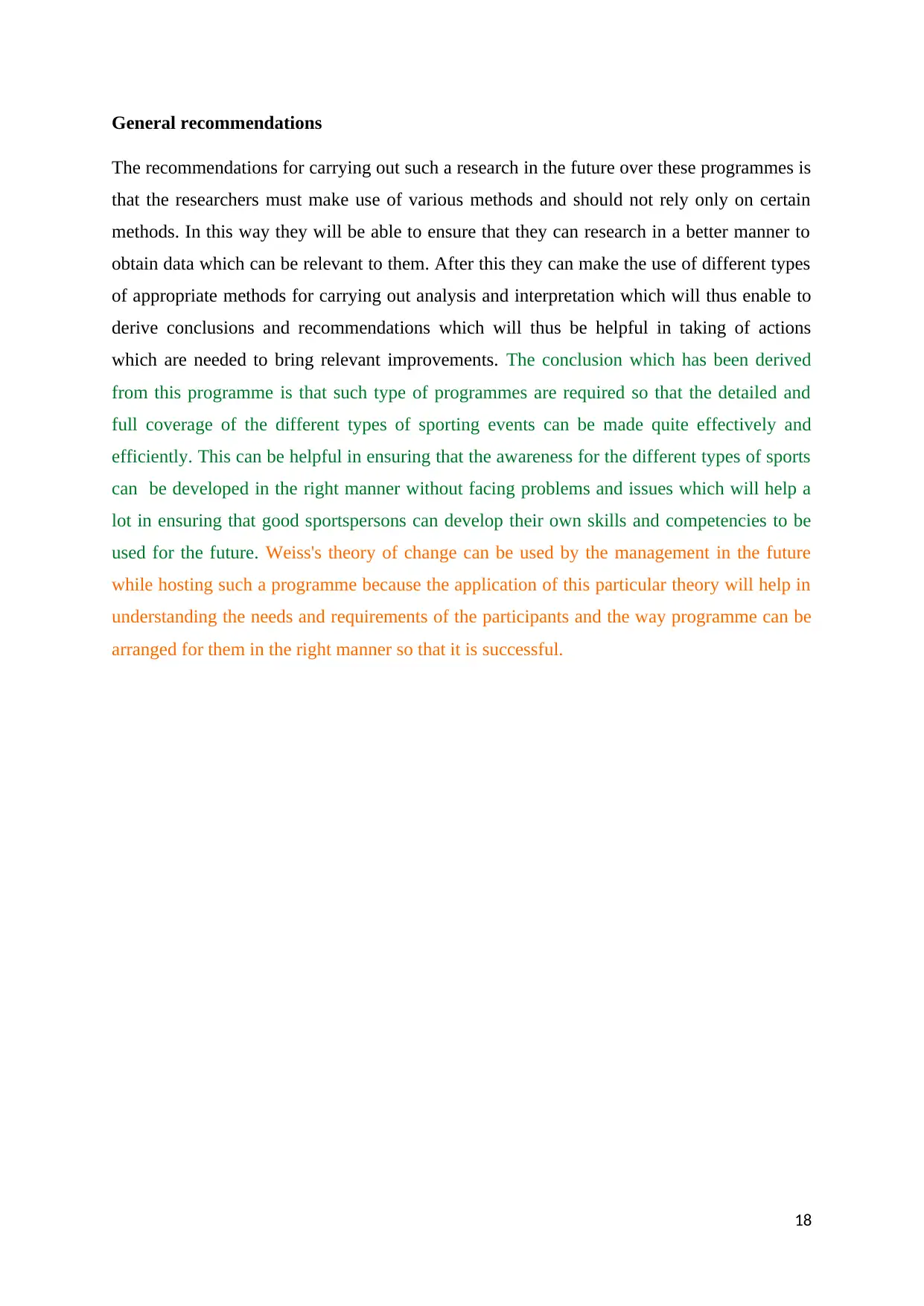
General recommendations
The recommendations for carrying out such a research in the future over these programmes is
that the researchers must make use of various methods and should not rely only on certain
methods. In this way they will be able to ensure that they can research in a better manner to
obtain data which can be relevant to them. After this they can make the use of different types
of appropriate methods for carrying out analysis and interpretation which will thus enable to
derive conclusions and recommendations which will thus be helpful in taking of actions
which are needed to bring relevant improvements. The conclusion which has been derived
from this programme is that such type of programmes are required so that the detailed and
full coverage of the different types of sporting events can be made quite effectively and
efficiently. This can be helpful in ensuring that the awareness for the different types of sports
can be developed in the right manner without facing problems and issues which will help a
lot in ensuring that good sportspersons can develop their own skills and competencies to be
used for the future. Weiss's theory of change can be used by the management in the future
while hosting such a programme because the application of this particular theory will help in
understanding the needs and requirements of the participants and the way programme can be
arranged for them in the right manner so that it is successful.
18
The recommendations for carrying out such a research in the future over these programmes is
that the researchers must make use of various methods and should not rely only on certain
methods. In this way they will be able to ensure that they can research in a better manner to
obtain data which can be relevant to them. After this they can make the use of different types
of appropriate methods for carrying out analysis and interpretation which will thus enable to
derive conclusions and recommendations which will thus be helpful in taking of actions
which are needed to bring relevant improvements. The conclusion which has been derived
from this programme is that such type of programmes are required so that the detailed and
full coverage of the different types of sporting events can be made quite effectively and
efficiently. This can be helpful in ensuring that the awareness for the different types of sports
can be developed in the right manner without facing problems and issues which will help a
lot in ensuring that good sportspersons can develop their own skills and competencies to be
used for the future. Weiss's theory of change can be used by the management in the future
while hosting such a programme because the application of this particular theory will help in
understanding the needs and requirements of the participants and the way programme can be
arranged for them in the right manner so that it is successful.
18
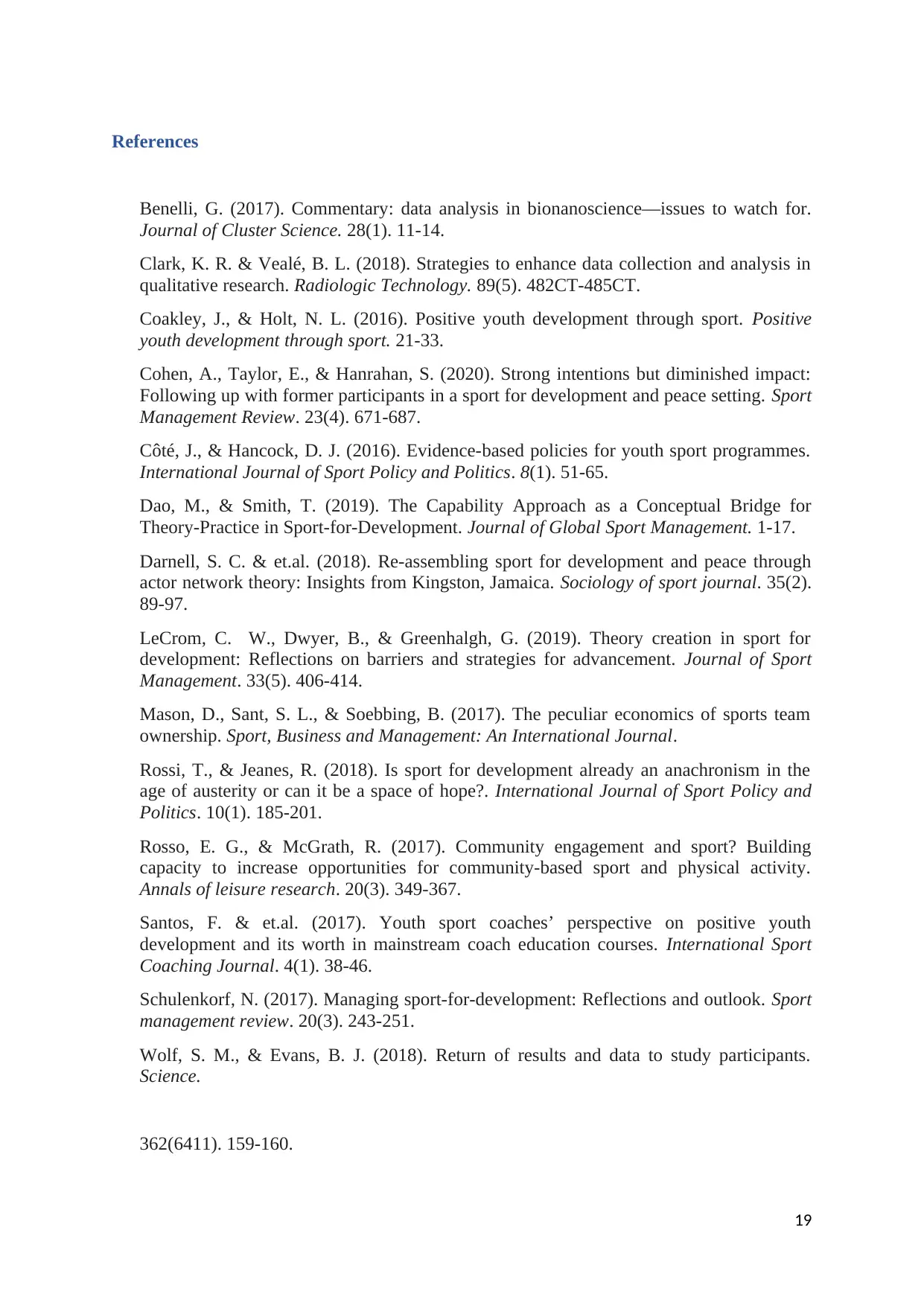
References
Benelli, G. (2017). Commentary: data analysis in bionanoscience—issues to watch for.
Journal of Cluster Science. 28(1). 11-14.
Clark, K. R. & Vealé, B. L. (2018). Strategies to enhance data collection and analysis in
qualitative research. Radiologic Technology. 89(5). 482CT-485CT.
Coakley, J., & Holt, N. L. (2016). Positive youth development through sport. Positive
youth development through sport. 21-33.
Cohen, A., Taylor, E., & Hanrahan, S. (2020). Strong intentions but diminished impact:
Following up with former participants in a sport for development and peace setting. Sport
Management Review. 23(4). 671-687.
Côté, J., & Hancock, D. J. (2016). Evidence-based policies for youth sport programmes.
International Journal of Sport Policy and Politics. 8(1). 51-65.
Dao, M., & Smith, T. (2019). The Capability Approach as a Conceptual Bridge for
Theory-Practice in Sport-for-Development. Journal of Global Sport Management. 1-17.
Darnell, S. C. & et.al. (2018). Re-assembling sport for development and peace through
actor network theory: Insights from Kingston, Jamaica. Sociology of sport journal. 35(2).
89-97.
LeCrom, C. W., Dwyer, B., & Greenhalgh, G. (2019). Theory creation in sport for
development: Reflections on barriers and strategies for advancement. Journal of Sport
Management. 33(5). 406-414.
Mason, D., Sant, S. L., & Soebbing, B. (2017). The peculiar economics of sports team
ownership. Sport, Business and Management: An International Journal.
Rossi, T., & Jeanes, R. (2018). Is sport for development already an anachronism in the
age of austerity or can it be a space of hope?. International Journal of Sport Policy and
Politics. 10(1). 185-201.
Rosso, E. G., & McGrath, R. (2017). Community engagement and sport? Building
capacity to increase opportunities for community-based sport and physical activity.
Annals of leisure research. 20(3). 349-367.
Santos, F. & et.al. (2017). Youth sport coaches’ perspective on positive youth
development and its worth in mainstream coach education courses. International Sport
Coaching Journal. 4(1). 38-46.
Schulenkorf, N. (2017). Managing sport-for-development: Reflections and outlook. Sport
management review. 20(3). 243-251.
Wolf, S. M., & Evans, B. J. (2018). Return of results and data to study participants.
Science.
362(6411). 159-160.
19
Benelli, G. (2017). Commentary: data analysis in bionanoscience—issues to watch for.
Journal of Cluster Science. 28(1). 11-14.
Clark, K. R. & Vealé, B. L. (2018). Strategies to enhance data collection and analysis in
qualitative research. Radiologic Technology. 89(5). 482CT-485CT.
Coakley, J., & Holt, N. L. (2016). Positive youth development through sport. Positive
youth development through sport. 21-33.
Cohen, A., Taylor, E., & Hanrahan, S. (2020). Strong intentions but diminished impact:
Following up with former participants in a sport for development and peace setting. Sport
Management Review. 23(4). 671-687.
Côté, J., & Hancock, D. J. (2016). Evidence-based policies for youth sport programmes.
International Journal of Sport Policy and Politics. 8(1). 51-65.
Dao, M., & Smith, T. (2019). The Capability Approach as a Conceptual Bridge for
Theory-Practice in Sport-for-Development. Journal of Global Sport Management. 1-17.
Darnell, S. C. & et.al. (2018). Re-assembling sport for development and peace through
actor network theory: Insights from Kingston, Jamaica. Sociology of sport journal. 35(2).
89-97.
LeCrom, C. W., Dwyer, B., & Greenhalgh, G. (2019). Theory creation in sport for
development: Reflections on barriers and strategies for advancement. Journal of Sport
Management. 33(5). 406-414.
Mason, D., Sant, S. L., & Soebbing, B. (2017). The peculiar economics of sports team
ownership. Sport, Business and Management: An International Journal.
Rossi, T., & Jeanes, R. (2018). Is sport for development already an anachronism in the
age of austerity or can it be a space of hope?. International Journal of Sport Policy and
Politics. 10(1). 185-201.
Rosso, E. G., & McGrath, R. (2017). Community engagement and sport? Building
capacity to increase opportunities for community-based sport and physical activity.
Annals of leisure research. 20(3). 349-367.
Santos, F. & et.al. (2017). Youth sport coaches’ perspective on positive youth
development and its worth in mainstream coach education courses. International Sport
Coaching Journal. 4(1). 38-46.
Schulenkorf, N. (2017). Managing sport-for-development: Reflections and outlook. Sport
management review. 20(3). 243-251.
Wolf, S. M., & Evans, B. J. (2018). Return of results and data to study participants.
Science.
362(6411). 159-160.
19
Paraphrase This Document
Need a fresh take? Get an instant paraphrase of this document with our AI Paraphraser
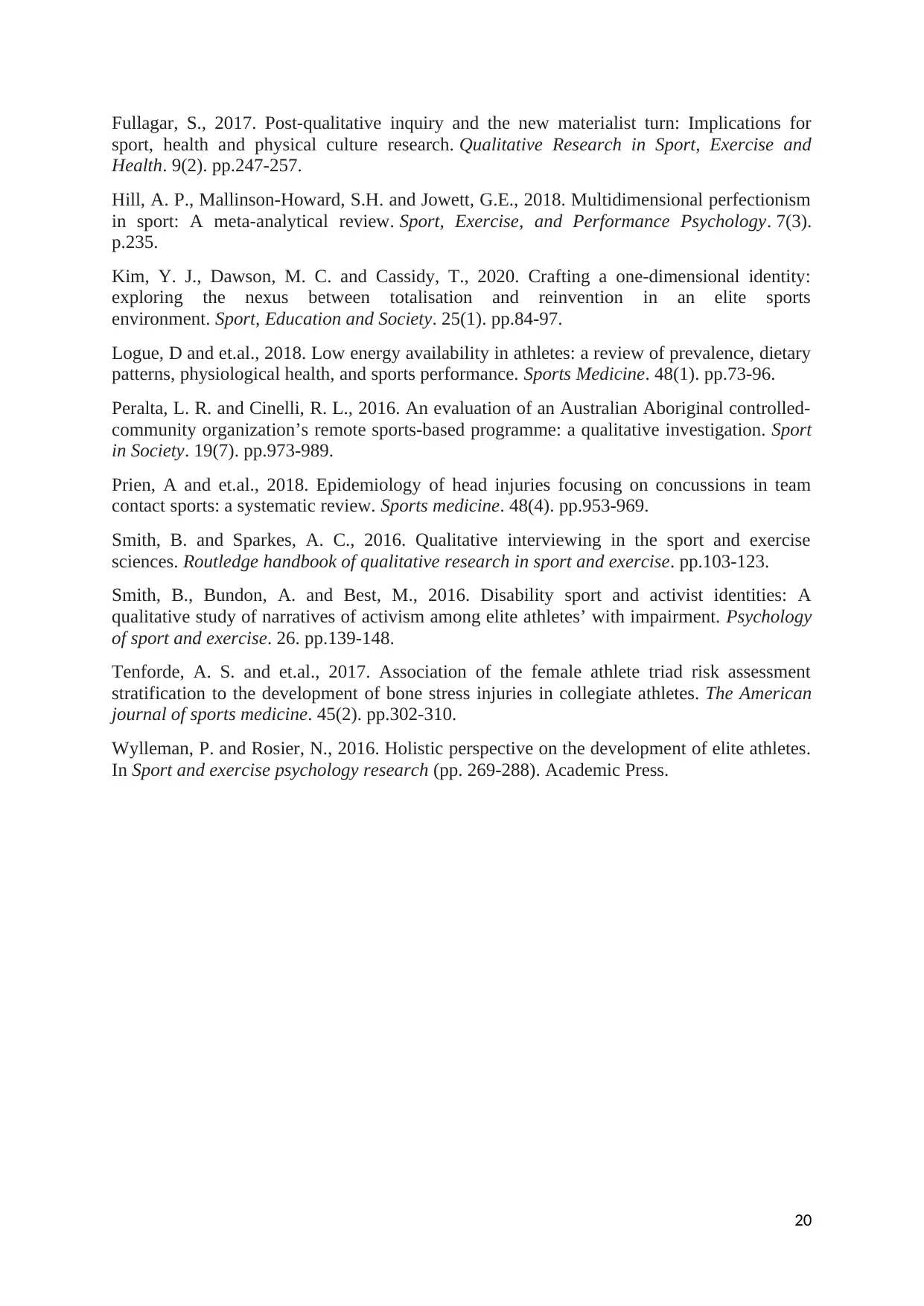
Fullagar, S., 2017. Post-qualitative inquiry and the new materialist turn: Implications for
sport, health and physical culture research. Qualitative Research in Sport, Exercise and
Health. 9(2). pp.247-257.
Hill, A. P., Mallinson-Howard, S.H. and Jowett, G.E., 2018. Multidimensional perfectionism
in sport: A meta-analytical review. Sport, Exercise, and Performance Psychology. 7(3).
p.235.
Kim, Y. J., Dawson, M. C. and Cassidy, T., 2020. Crafting a one-dimensional identity:
exploring the nexus between totalisation and reinvention in an elite sports
environment. Sport, Education and Society. 25(1). pp.84-97.
Logue, D and et.al., 2018. Low energy availability in athletes: a review of prevalence, dietary
patterns, physiological health, and sports performance. Sports Medicine. 48(1). pp.73-96.
Peralta, L. R. and Cinelli, R. L., 2016. An evaluation of an Australian Aboriginal controlled-
community organization’s remote sports-based programme: a qualitative investigation. Sport
in Society. 19(7). pp.973-989.
Prien, A and et.al., 2018. Epidemiology of head injuries focusing on concussions in team
contact sports: a systematic review. Sports medicine. 48(4). pp.953-969.
Smith, B. and Sparkes, A. C., 2016. Qualitative interviewing in the sport and exercise
sciences. Routledge handbook of qualitative research in sport and exercise. pp.103-123.
Smith, B., Bundon, A. and Best, M., 2016. Disability sport and activist identities: A
qualitative study of narratives of activism among elite athletes’ with impairment. Psychology
of sport and exercise. 26. pp.139-148.
Tenforde, A. S. and et.al., 2017. Association of the female athlete triad risk assessment
stratification to the development of bone stress injuries in collegiate athletes. The American
journal of sports medicine. 45(2). pp.302-310.
Wylleman, P. and Rosier, N., 2016. Holistic perspective on the development of elite athletes.
In Sport and exercise psychology research (pp. 269-288). Academic Press.
20
sport, health and physical culture research. Qualitative Research in Sport, Exercise and
Health. 9(2). pp.247-257.
Hill, A. P., Mallinson-Howard, S.H. and Jowett, G.E., 2018. Multidimensional perfectionism
in sport: A meta-analytical review. Sport, Exercise, and Performance Psychology. 7(3).
p.235.
Kim, Y. J., Dawson, M. C. and Cassidy, T., 2020. Crafting a one-dimensional identity:
exploring the nexus between totalisation and reinvention in an elite sports
environment. Sport, Education and Society. 25(1). pp.84-97.
Logue, D and et.al., 2018. Low energy availability in athletes: a review of prevalence, dietary
patterns, physiological health, and sports performance. Sports Medicine. 48(1). pp.73-96.
Peralta, L. R. and Cinelli, R. L., 2016. An evaluation of an Australian Aboriginal controlled-
community organization’s remote sports-based programme: a qualitative investigation. Sport
in Society. 19(7). pp.973-989.
Prien, A and et.al., 2018. Epidemiology of head injuries focusing on concussions in team
contact sports: a systematic review. Sports medicine. 48(4). pp.953-969.
Smith, B. and Sparkes, A. C., 2016. Qualitative interviewing in the sport and exercise
sciences. Routledge handbook of qualitative research in sport and exercise. pp.103-123.
Smith, B., Bundon, A. and Best, M., 2016. Disability sport and activist identities: A
qualitative study of narratives of activism among elite athletes’ with impairment. Psychology
of sport and exercise. 26. pp.139-148.
Tenforde, A. S. and et.al., 2017. Association of the female athlete triad risk assessment
stratification to the development of bone stress injuries in collegiate athletes. The American
journal of sports medicine. 45(2). pp.302-310.
Wylleman, P. and Rosier, N., 2016. Holistic perspective on the development of elite athletes.
In Sport and exercise psychology research (pp. 269-288). Academic Press.
20

21
1 out of 21
Your All-in-One AI-Powered Toolkit for Academic Success.
+13062052269
info@desklib.com
Available 24*7 on WhatsApp / Email
![[object Object]](/_next/static/media/star-bottom.7253800d.svg)
Unlock your academic potential
© 2024 | Zucol Services PVT LTD | All rights reserved.